
 |
| INTRO | PARTS |
SETS Moubal Jumbo |
MANUALS Moubal Jumbo |
MARKETING |
PRICE
LISTS |
BUILDING |
MOUBAL RELATED |
|
MOUBAL
MANUALS
Every set included a manual. As with the sets, there is a clear difference between the pre-war manuals produced by Moubal, and the post-war manuals by Jumbo. Manuals generally follow the chronology of the sets, which was: 1924: Set 1, Set 2 1925: Set 0, Set 1a (make-up set from 1 to 2) 1926: Set 00 (early 1926), Set 3, Set 4, Station No. 1, Station No. 2 1931: Set 2a (make-up set from 2 to 3) 1932: Set 000 1935: Set 01, Garage No. 1, Garage No. 2 1936: Set 0a (make-up set from 0 to reduced Set 1). Windmill No. 1 and Windmill No. 2 (not sold as Mobaco, but compatible). Parts count in Set 1 is reduced, and increased in Set 1a. 1937: Stations en Garages discontinued 1938: Small Garage (discontinued after 1941) 1943: Production stopped (last print run of manuals is April 1942) 1948: Moubal sets available again 1949: Jumbo starts marketing Mobaco under their own brand name and with different boxes 1953: Moubal sets discontinued (last price list is from fall 1952). So for 4 years, both Jumbo and Moubal sets were available at the same time 1961: Last year that Mobaco sets appear in the Jumbo catalog. For each manual below, there is a picture of the cover, thumbnails of each page, and some basic statistics. All cover pages are shown at half of actual size. Thumbnails are shown at 1/5th actual size. A link sends you to full size page views (100 dpi scans). Where possible, a PDF with 150 dpi scans is provided for downloading. Some browsers will download the PDF, others will show it on screen, in which case you can save it by hovering your cursor over the bottom of the image and a save button will appear. Printing the PDF at 100% will result in a booklet of the same size as the original. |
|
||||||||||||||||||||||||||||||||||||||||||||||||||||||||||||||||||||||||||||||||||||||||||||||||||||||||||||||||||||||||||||||||||||||||||||||||||||||||||||||||
Jump directly to: |
||||||||||||||||||||||||||||||||||||||||||||||||||||||||||||||||||||||||||||||||||||||||||||||||||||||||||||||||||||||||||||||||||||||||||||||||||||||||||||||||||
1924 - SET 1 MANUAL (ROUND WINDOWS, NO TEXT) Initially, Moubal issued two instruction manuals, one for Set 1, and one for Set 2. They featured the same cover illustration, but the Set 2 manual was much larger, so they surrounded the illustration with green windows and guardrails. Since the two manuals were so different, there was no need to identify them. Manual No.1 came with Set 1, first introduced in 1924. The cover was colorful and featured very large models, much larger than could be built with this set. The rear cover also has a model, shown both half completed and finished. This model too requires far more than a No. 1 set! 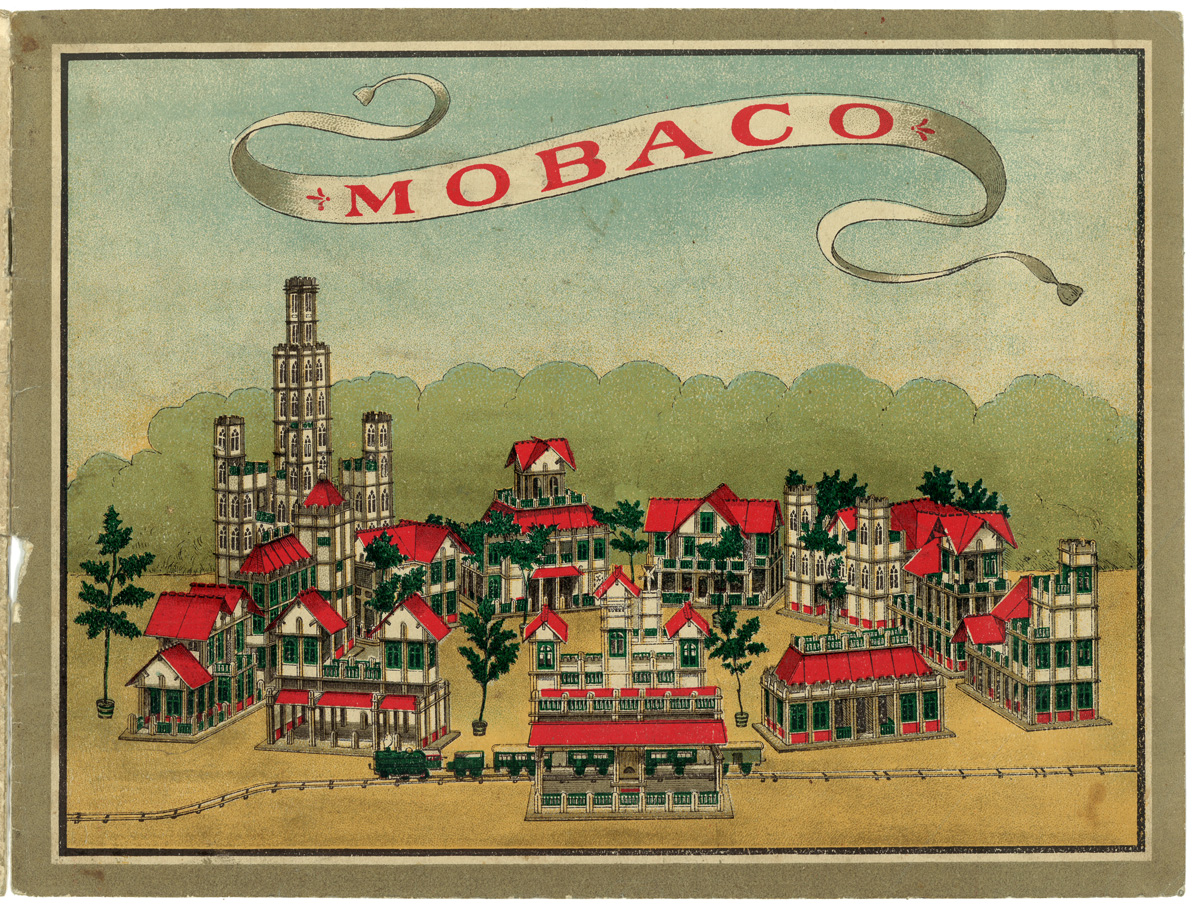 300 x 225 mm 20 pages (incl. covers) Colored front cover, B&W interior + rear cover 24 designs (plus rear cover) See pages DOWNLOAD PDF |
||||||||||||||||||||||||||||||||||||||||||||||||||||||||||||||||||||||||||||||||||||||||||||||||||||||||||||||||||||||||||||||||||||||||||||||||||||||||||||||||||
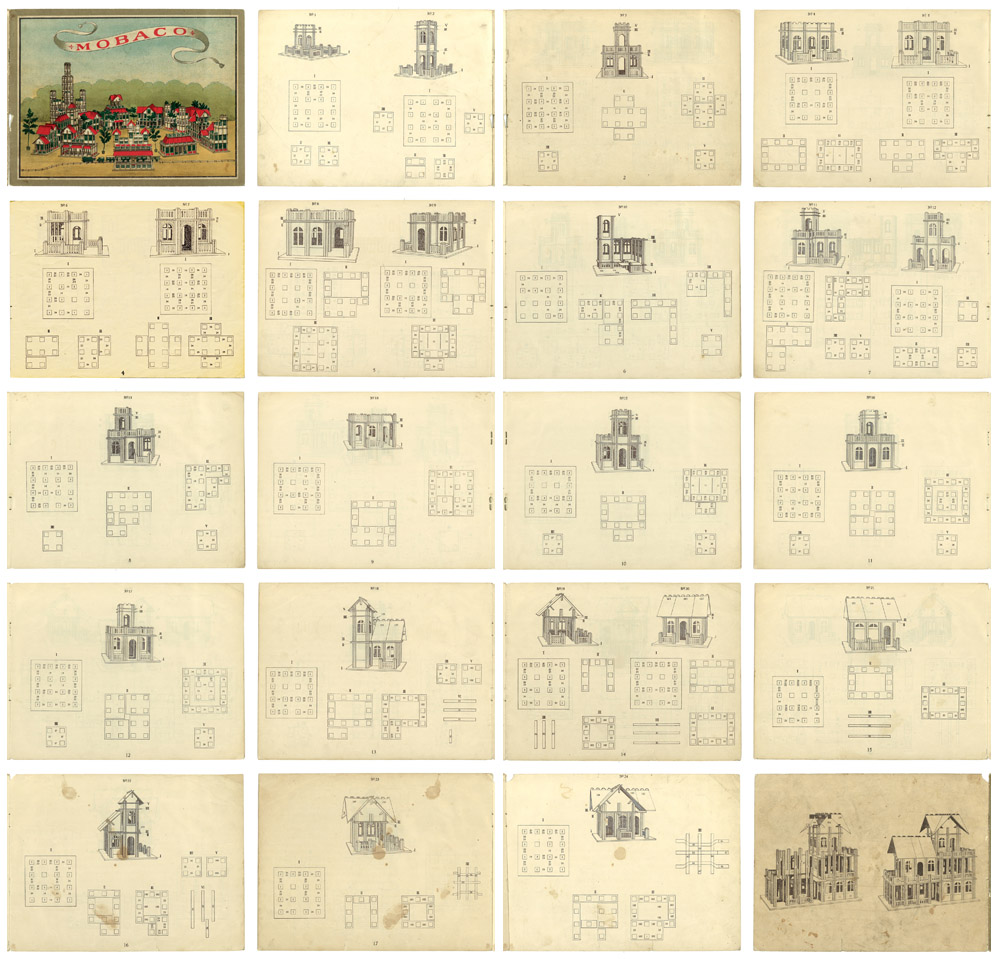 Manual courtesy Leen Kalden |
||||||||||||||||||||||||||||||||||||||||||||||||||||||||||||||||||||||||||||||||||||||||||||||||||||||||||||||||||||||||||||||||||||||||||||||||||||||||||||||||||
1924 - SET 2 MANUAL (ROUND WINDOWS, NO TEXT) This manual is huge, larger than A3. To give an idea of proportion, all covers on this web page are shown at the same scale. Models 1-24 are all with a square 4x4 ground plate and can be built with Set 1. The designs are identical to those in the Set 1 Manual above, except that the plans have been rearranged on the page to be more compact. They now fit on 9-1/2 pages instead of 18 (smaller) pages. Models 25-40 are with a rectangular 4x8 ground plate and can be built with Set 2. Set 2 does not included a square ground plate, but Models 1-24 could of course be built on a 4x8 plate. Statistics: 458 x 300 mm 28 pages (incl. covers) Colored covers (black + spot colors gray, red, green, light blue, tan) B&W interior 40 designs (+ 1 inside front cover + 1 on rear cover, both requiring more than a Set No. 2) See pages DOWNLOAD PDF (41 MB) 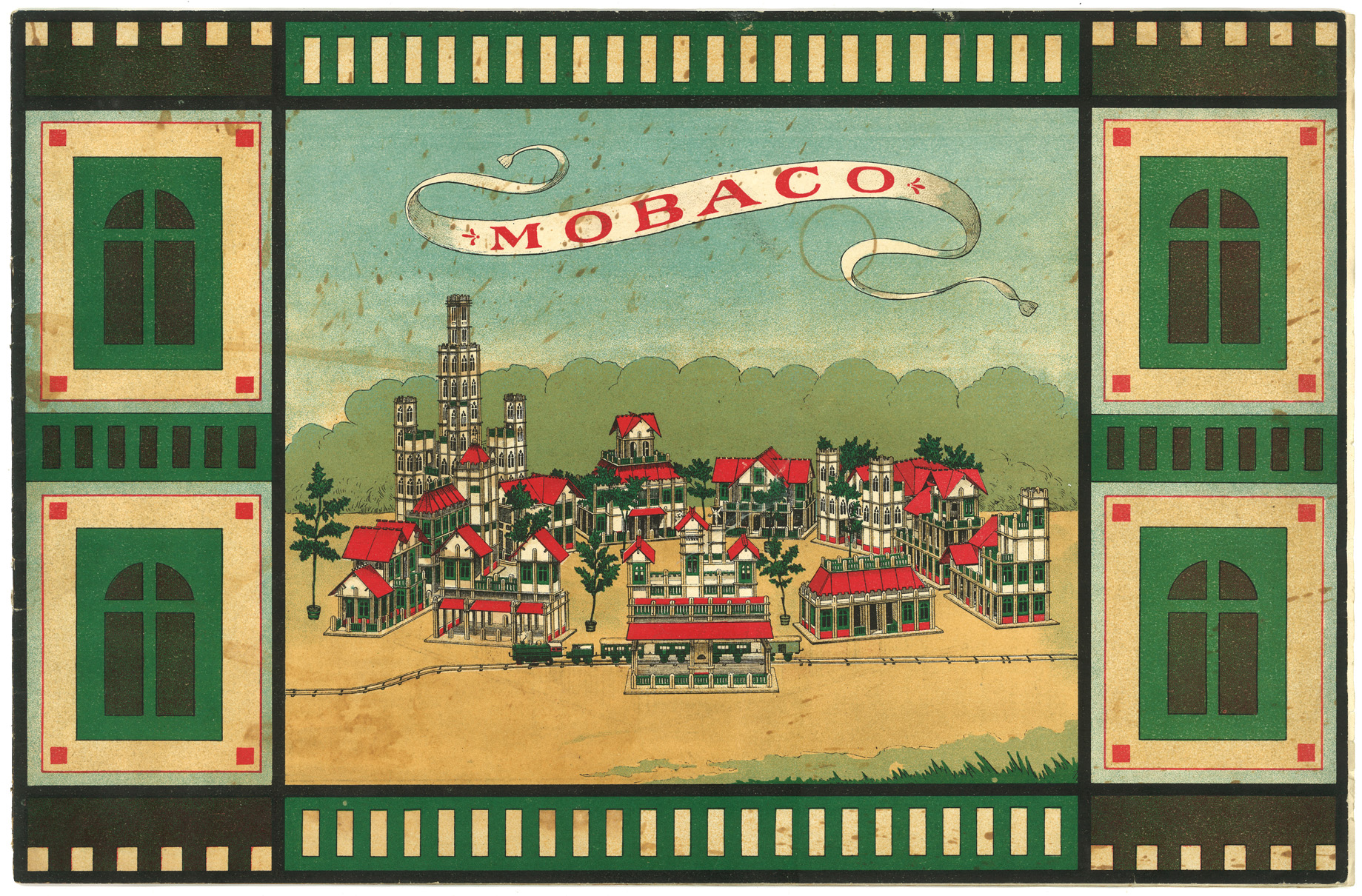 |
||||||||||||||||||||||||||||||||||||||||||||||||||||||||||||||||||||||||||||||||||||||||||||||||||||||||||||||||||||||||||||||||||||||||||||||||||||||||||||||||||
Note: thumbnails
below are shown at 90% relative to other thumbnails on
this web page: 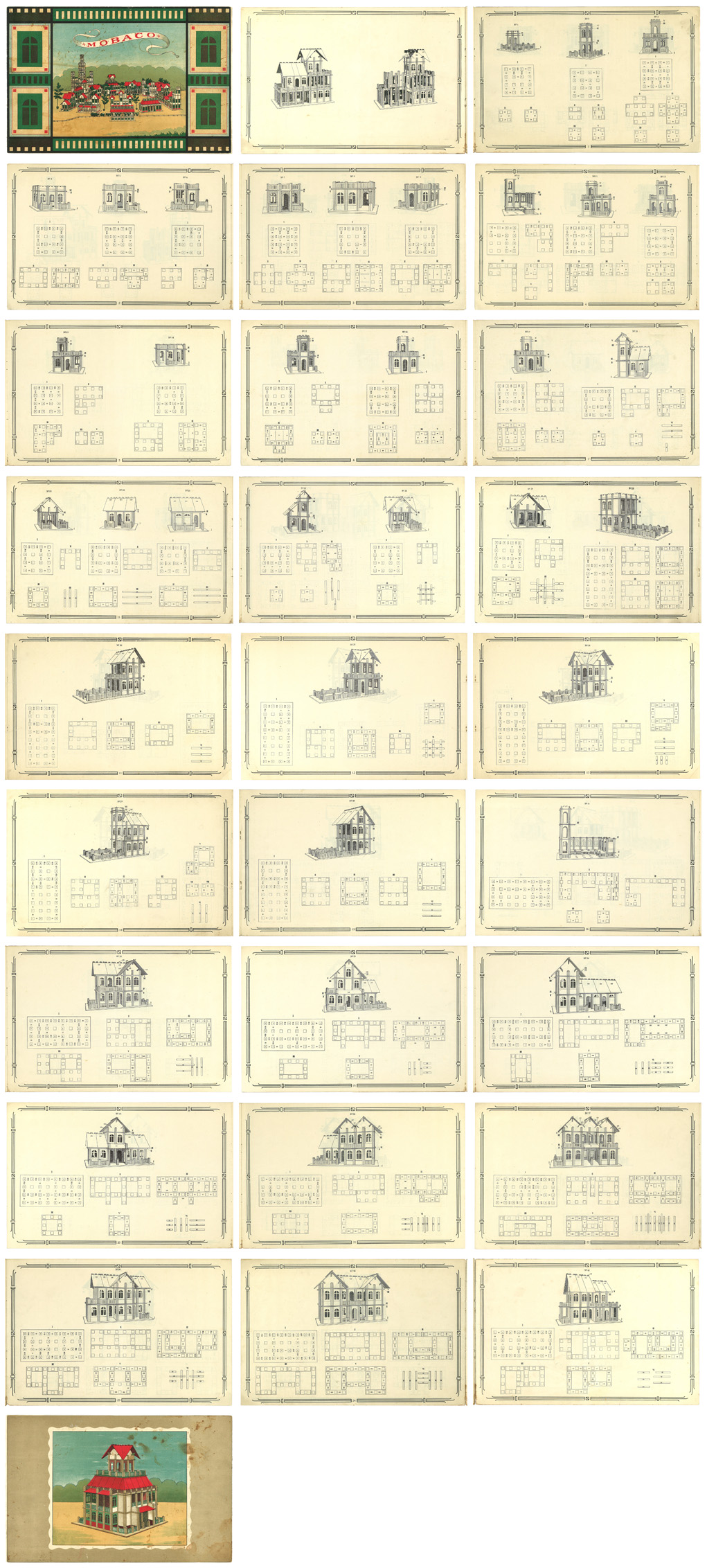 Manual courtesy Leen Kalden |
||||||||||||||||||||||||||||||||||||||||||||||||||||||||||||||||||||||||||||||||||||||||||||||||||||||||||||||||||||||||||||||||||||||||||||||||||||||||||||||||||
1926 (EARLY) - SET 00 (ART NOUVEAU BORDER) Set 00 is introduced in 1926, probably in the spring. This simple fold-out sheet has Art Nouveau borders similar to the original manual for Sets 1 and 2. It just fits in the new small Set 000 box which is sized for the 3x3 ground plate (which is 168 x 168 mm). Note that there is no mention of Trade Mark, which is found in the next version. 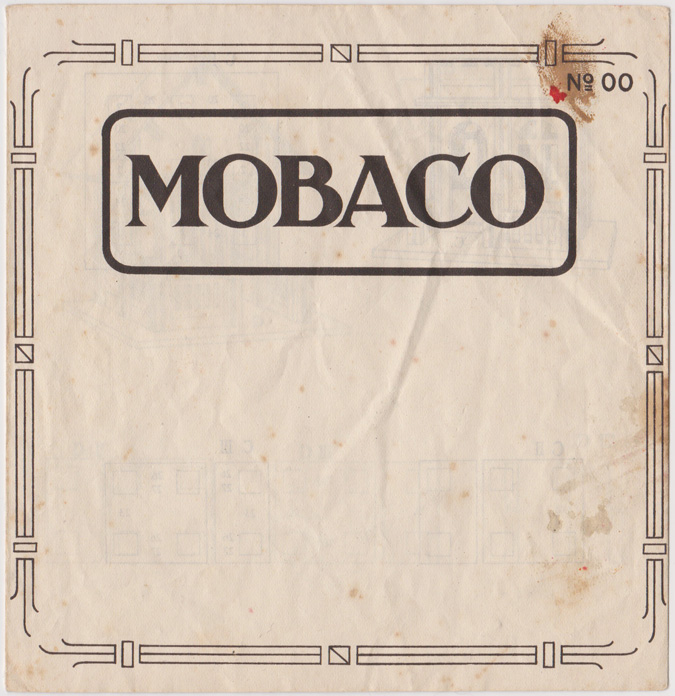 174 x 174 mm 6 pages (incl. covers) B&W 5 designs See pages DOWNLOAD PDF |
||||||||||||||||||||||||||||||||||||||||||||||||||||||||||||||||||||||||||||||||||||||||||||||||||||||||||||||||||||||||||||||||||||||||||||||||||||||||||||||||||
 Scans courtesy Leen Kalden 1926 (MID) - USA REGISTERED TRADE MARK On April 15th, 1926 Moubal submits a Trade Mark application in the USA, which is published on September 7th, 1926. The manuals for sets 00, 0, 1 and 2, which already existed without a Trade Mark note, were republished with a Registered Trade Mark note starting in the fall of 1926. |
||||||||||||||||||||||||||||||||||||||||||||||||||||||||||||||||||||||||||||||||||||||||||||||||||||||||||||||||||||||||||||||||||||||||||||||||||||||||||||||||||
1926 (LATE) - SET 00 VERSION 2 (WITH TRADE MARK) |
||||||||||||||||||||||||||||||||||||||||||||||||||||||||||||||||||||||||||||||||||||||||||||||||||||||||||||||||||||||||||||||||||||||||||||||||||||||||||||||||||
| Same as above, except added text to cover: - GEDEPONEERD HANDELSMERK / REGISTERED TRADE MARK - NEDERLANDSCH FABRIKAAT / MADE IN HOLLAND Date is unknown, but after early 1926 and before ±1931, when it is replaced with the "gnomes" manual. Since it has the mention Registered Trade Mark, it's probably released after registration of the trade mark in the USA in the summer of 1926. So this version is likely from late 1926. 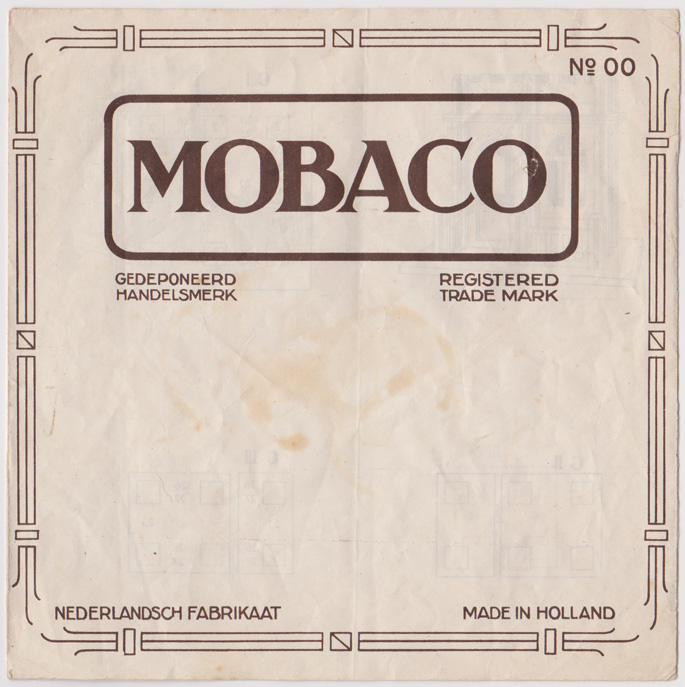 174 x 174 mm 6 pages (incl. covers) B&W 5 designs See pages DOWNLOAD PDF |
||||||||||||||||||||||||||||||||||||||||||||||||||||||||||||||||||||||||||||||||||||||||||||||||||||||||||||||||||||||||||||||||||||||||||||||||||||||||||||||||||
 Scans courtesy of Leen Kalden |
||||||||||||||||||||||||||||||||||||||||||||||||||||||||||||||||||||||||||||||||||||||||||||||||||||||||||||||||||||||||||||||||||||||||||||||||||||||||||||||||||
1926 - SET 0 MANUAL (ROUND WINDOWS, WITH TRADE MARK) |
||||||||||||||||||||||||||||||||||||||||||||||||||||||||||||||||||||||||||||||||||||||||||||||||||||||||||||||||||||||||||||||||||||||||||||||||||||||||||||||||||
| In
1926, a Set 0
manual is issued
using the same
image, but
cropped. Added to the cover are the set number, "Nederlandsch Fabrikaat" and "Gedeponeerd Handelsmerk" as well as "Made in Holland" and "Registered Trademark" (which mean the same). Likely also in 1925, a slightly revised version of the above manuals No. 1 and No. 2 is issued, now also with a set number (No. 1 or No. 2), "Nederlandsch Fabrikaat", "Gedeponeerd Handelsmerk", "Made in Holland" and "Registered Trademark." See further below. Numbering the covers made it easier to distinguish between the manuals. All models in the Set 0 manual are new, except for No. 01 and 08, which are copied from the Set 1 and Set 2 Manuals (where they are numbered 1 and 19 respectively). 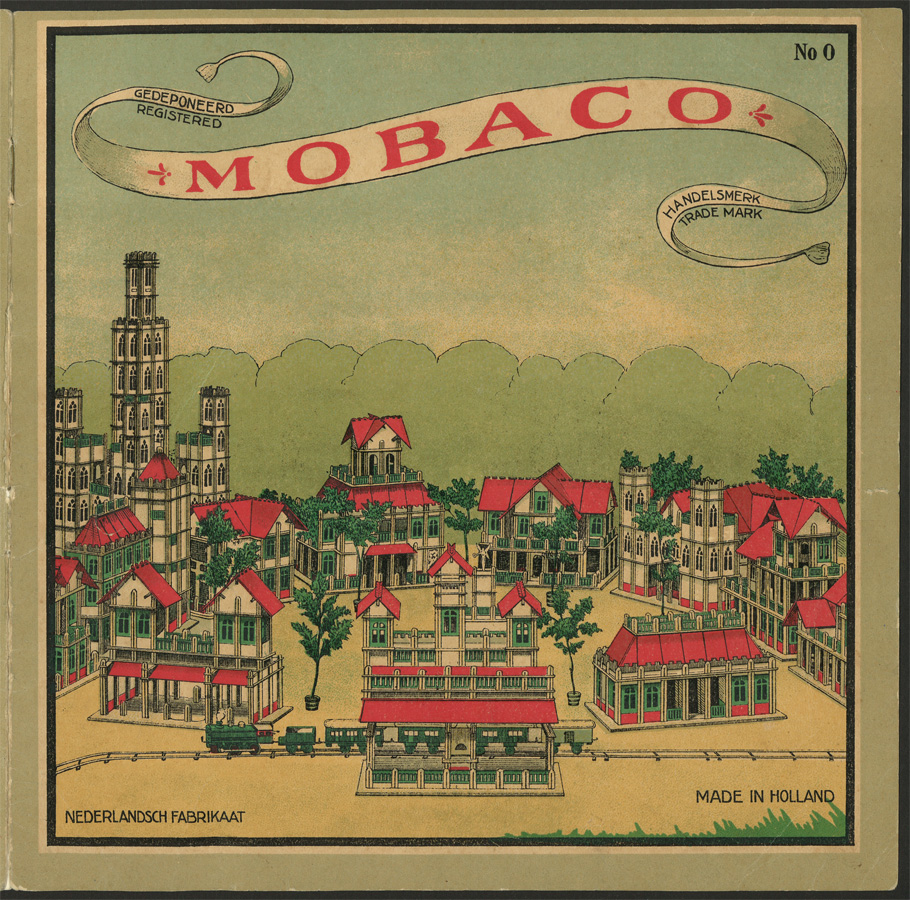 227 x 224 mm 12 pages (incl. covers) Colored front and rear covers, B&W interior 8 designs (excluding covers) See pages DOWNLOAD PDF |
||||||||||||||||||||||||||||||||||||||||||||||||||||||||||||||||||||||||||||||||||||||||||||||||||||||||||||||||||||||||||||||||||||||||||||||||||||||||||||||||||
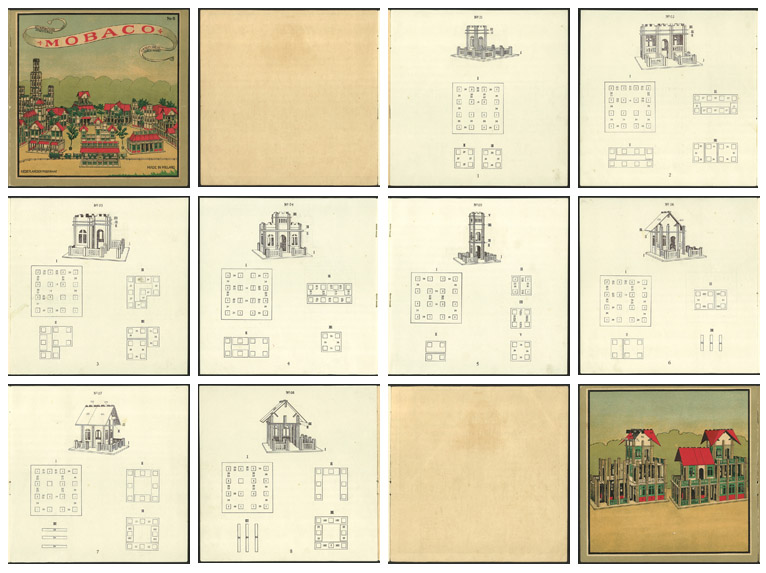 Manual courtesy Leen Kalden 1926 - SET 1 MANUAL (ROUND WINDOWS, WITH TRADE MARK) |
||||||||||||||||||||||||||||||||||||||||||||||||||||||||||||||||||||||||||||||||||||||||||||||||||||||||||||||||||||||||||||||||||||||||||||||||||||||||||||||||||
Identical to Set 1 Manual above,
except for added text on the covers, and the rear
cover is now in color as well.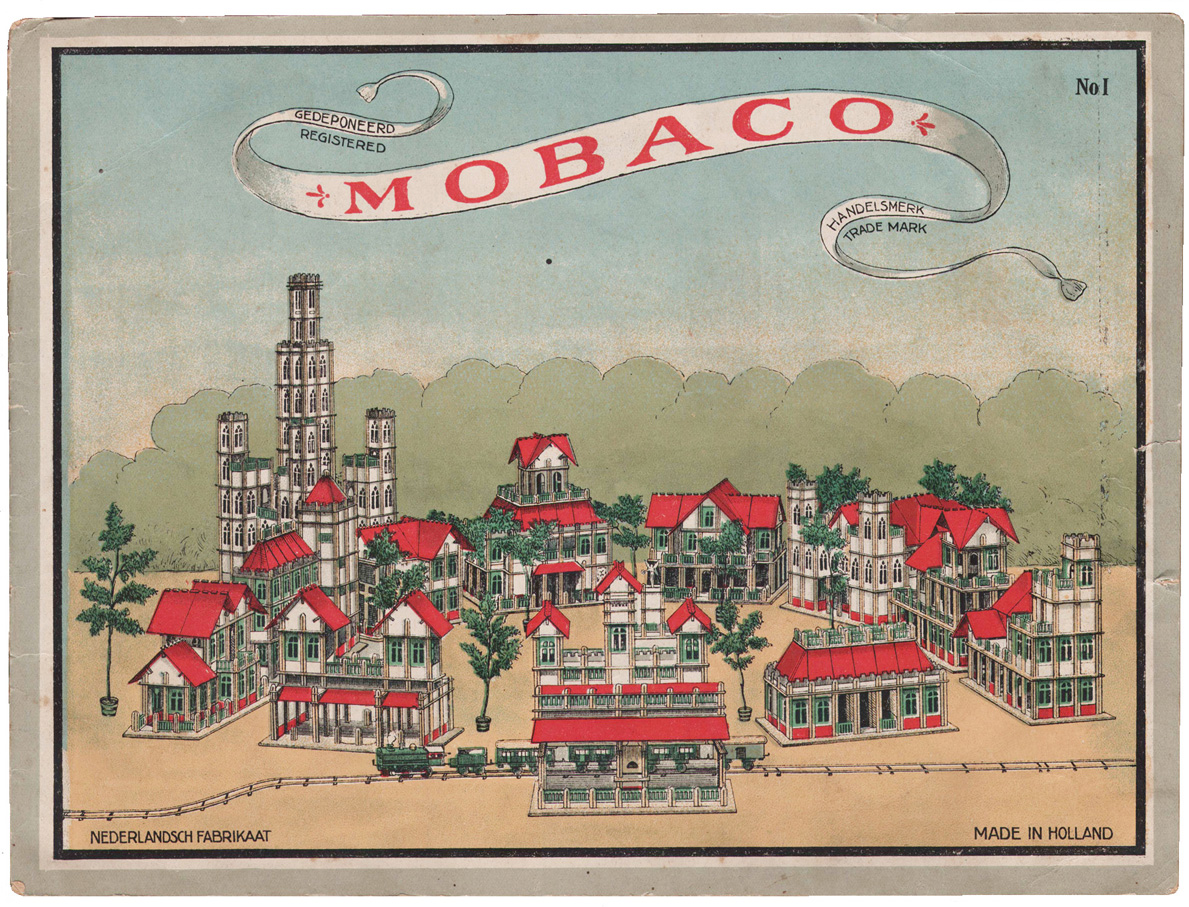 300 x 225 mm 20 pages (incl. covers) Colored front and rear covers, B&W interior 25 designs (including rear cover) See pages DOWNLOAD PDF |
||||||||||||||||||||||||||||||||||||||||||||||||||||||||||||||||||||||||||||||||||||||||||||||||||||||||||||||||||||||||||||||||||||||||||||||||||||||||||||||||||
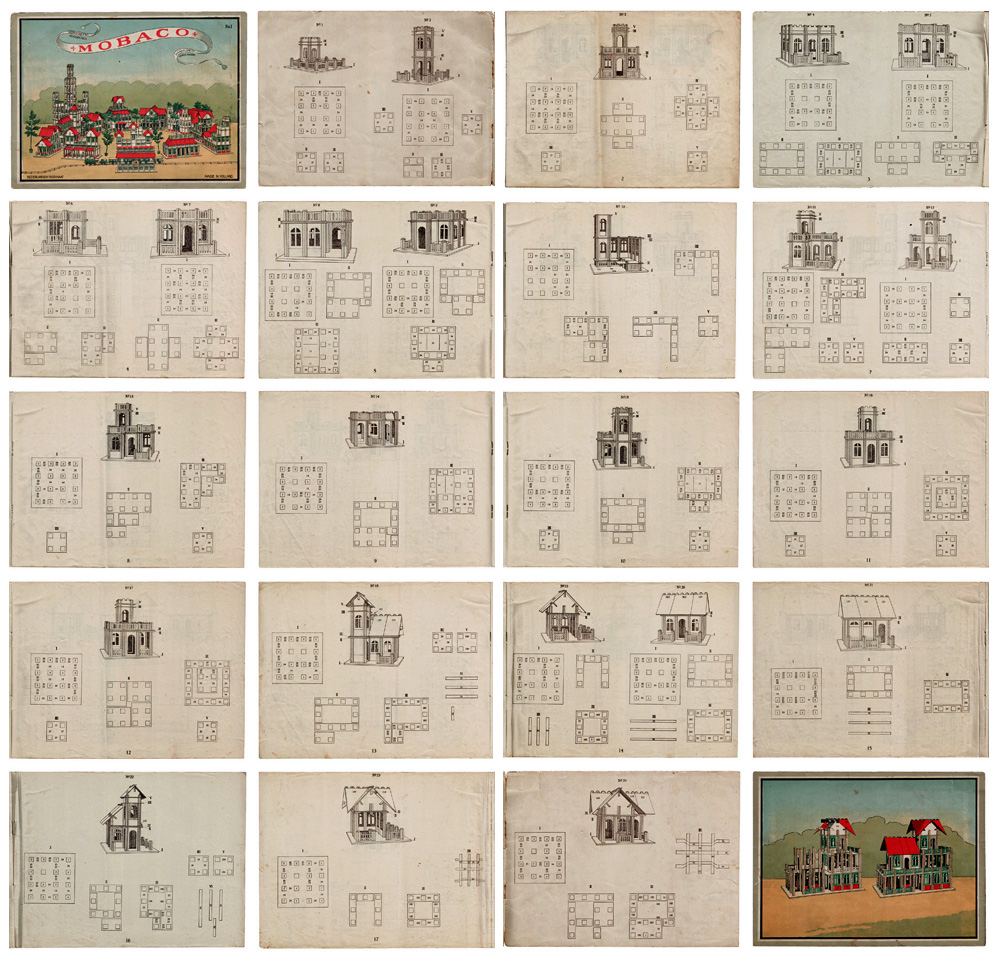 Scans courtesy Leen Kalden 1926 - SET 2 MANUAL (ROUND WINDOWS, WITH TRADE MARK) |
||||||||||||||||||||||||||||||||||||||||||||||||||||||||||||||||||||||||||||||||||||||||||||||||||||||||||||||||||||||||||||||||||||||||||||||||||||||||||||||||||
| This manual is identical to
the 1924 version above, except for added text
on the covers: - front cover: No. 2, Gedeponeerd/Registered, Handelsmerk/Trade Mark. - rear cover: Nederlandsch Fabrikaat / Made in Holland Contents are the same as Set 2 manual above. Statistics: 458 x 300 mm 28 pages (incl. covers) Colored front and rear covers (black + spot colors gray, red, green, light blue, tan) B&W interior 40 designs (+ 1 inside front cover + 1 on rear cover, both requiring more than a Set No. 2) See pages (covers only) DOWNLOAD PDF (covers only) 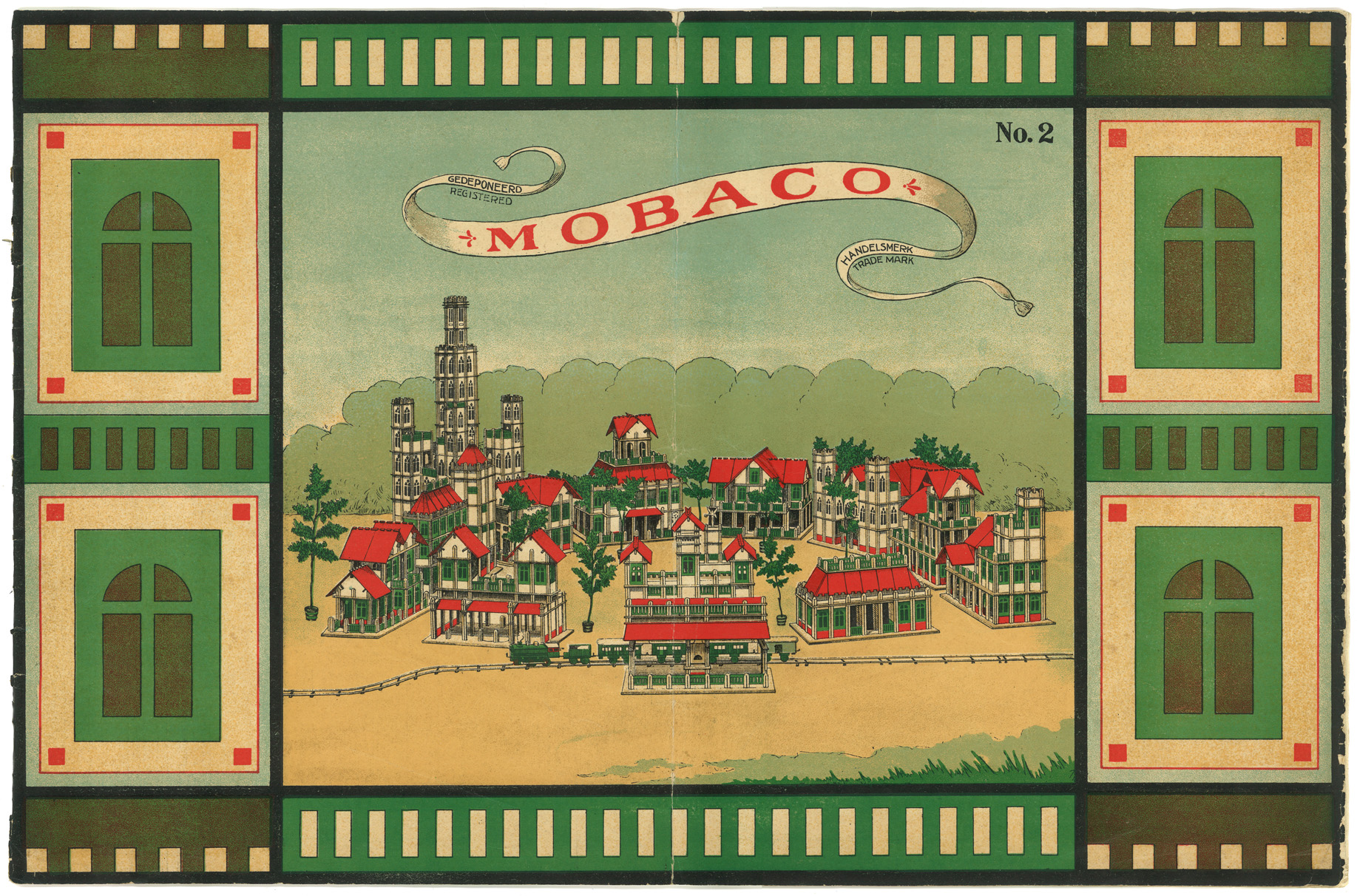 |
||||||||||||||||||||||||||||||||||||||||||||||||||||||||||||||||||||||||||||||||||||||||||||||||||||||||||||||||||||||||||||||||||||||||||||||||||||||||||||||||||
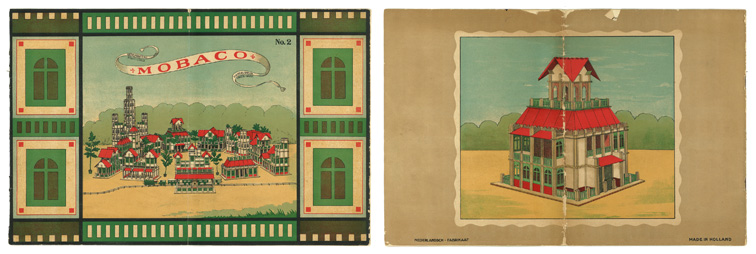 Manual courtesy of Leen Kalden 1926 - TRAIN STATION No. 1 MANUAL |
||||||||||||||||||||||||||||||||||||||||||||||||||||||||||||||||||||||||||||||||||||||||||||||||||||||||||||||||||||||||||||||||||||||||||||||||||||||||||||||||||
Note: these are scans
of photocopies.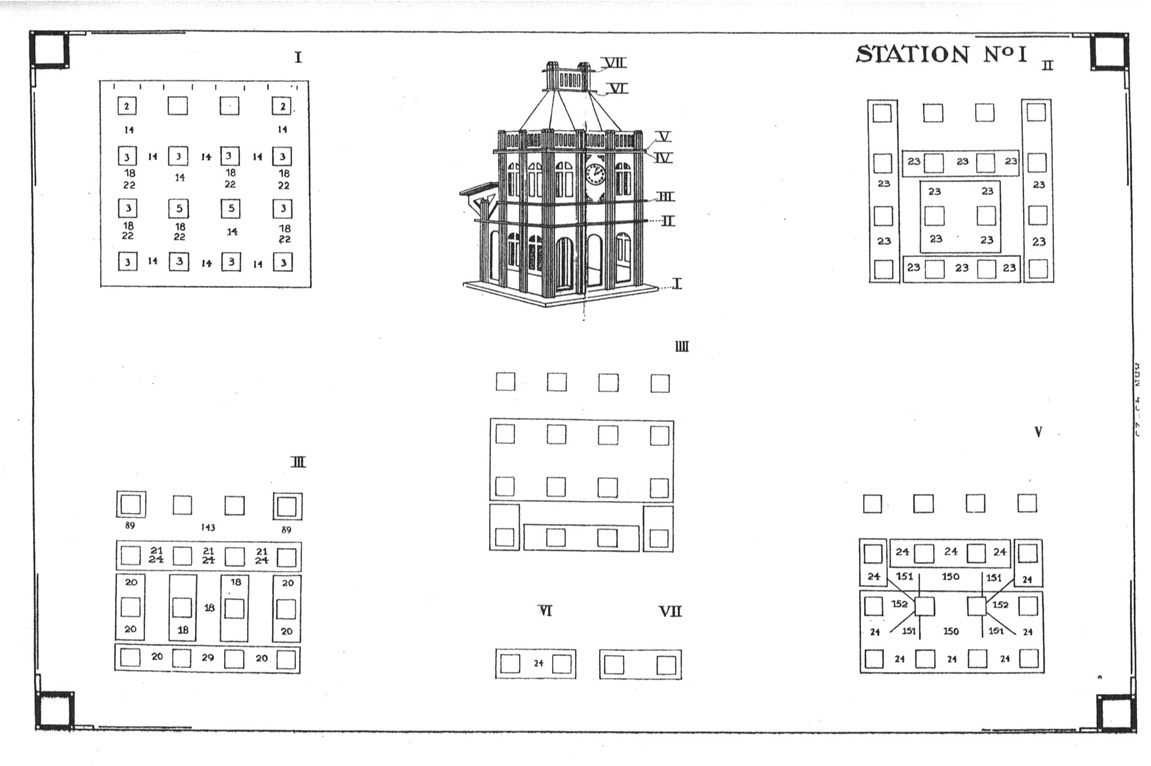 293 x 195 mm 2 pages B&W printing 2 designs (station + platform shed) See pages DOWNLOAD PDF |
||||||||||||||||||||||||||||||||||||||||||||||||||||||||||||||||||||||||||||||||||||||||||||||||||||||||||||||||||||||||||||||||||||||||||||||||||||||||||||||||||
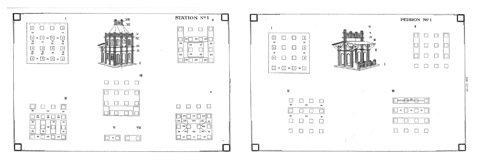 Scans courtesy Robj Schiff 1926 - TRAIN STATION No. 2 MANUAL |
||||||||||||||||||||||||||||||||||||||||||||||||||||||||||||||||||||||||||||||||||||||||||||||||||||||||||||||||||||||||||||||||||||||||||||||||||||||||||||||||||
Note: design of Train
Station No. 2 is identical to models
60 and 60a in the Set
1-4 manual (with gnomes
on the cover), which could be built
with Set 3.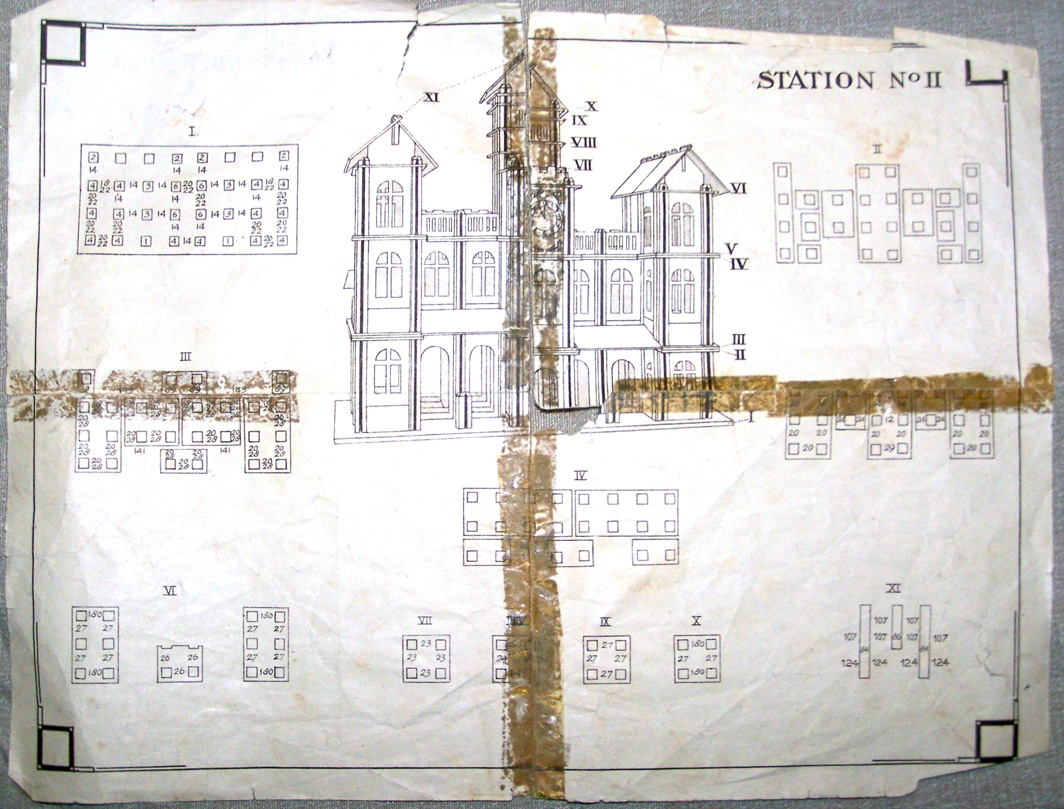 265 x 203 mm (verify) 2 pages B&W printing 2 designs (station + platform shed) See pages DOWNLOAD PDF |
||||||||||||||||||||||||||||||||||||||||||||||||||||||||||||||||||||||||||||||||||||||||||||||||||||||||||||||||||||||||||||||||||||||||||||||||||||||||||||||||||
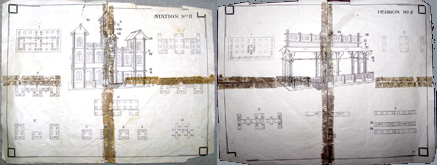 Scans courtesy Henri de Graaf 1928? - SET 0 MANUAL (ART DECO, ROUND WINDOWS) |
||||||||||||||||||||||||||||||||||||||||||||||||||||||||||||||||||||||||||||||||||||||||||||||||||||||||||||||||||||||||||||||||||||||||||||||||||||||||||||||||||
Other than the
covers, this manual is identical to the Set 0 Manual above
(with village and text on covers). It is shown
in a photograph in an article
about Mobaco from mid-1931. This is probably the
last year that this manual was in use, as the
gnomes manual for Set 00+0+1 was likely
introduced in the fall of 1931.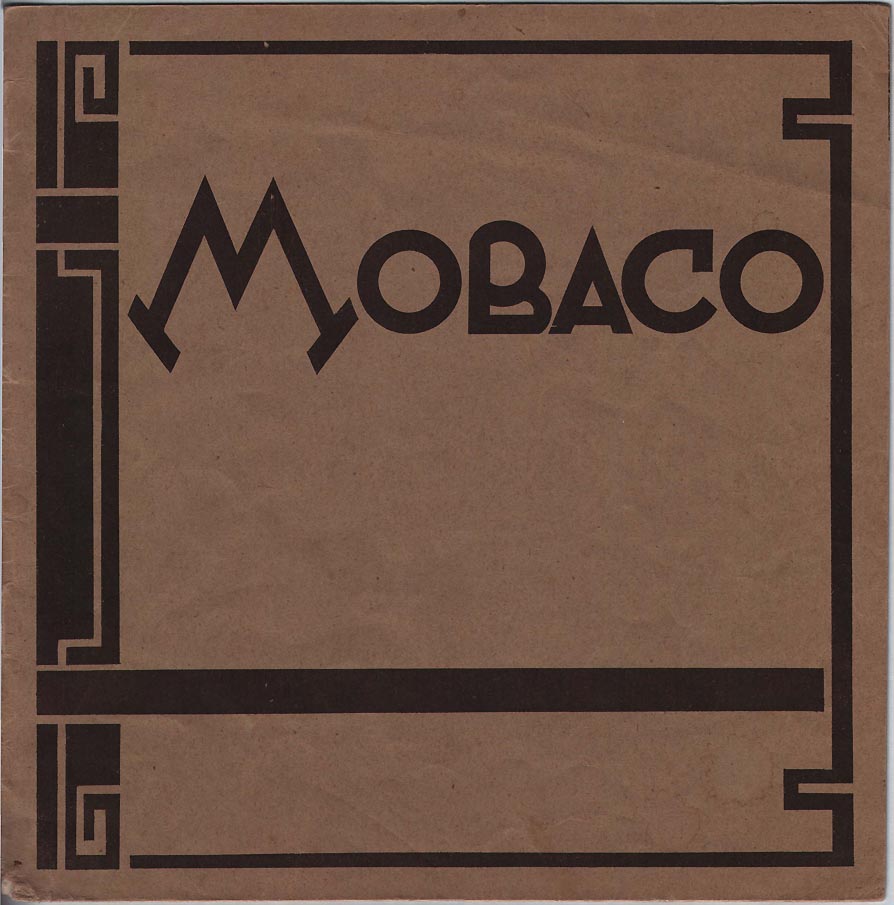 228 x 228 mm (verify) 12 pages (including covers) B&W printing 8 designs See pages DOWNLOAD PDF |
||||||||||||||||||||||||||||||||||||||||||||||||||||||||||||||||||||||||||||||||||||||||||||||||||||||||||||||||||||||||||||||||||||||||||||||||||||||||||||||||||
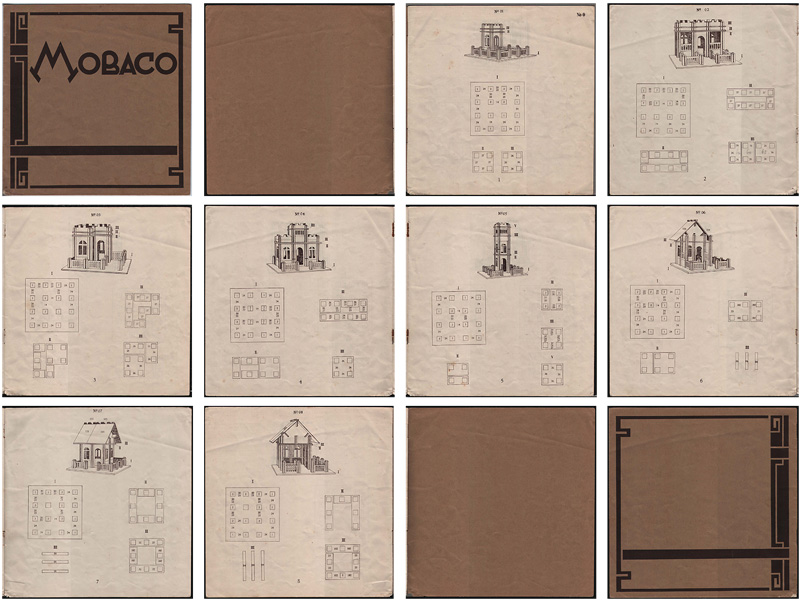 Scans courtesy Leen Kalden 1928? - SET 1+2 MANUAL (ART DECO, ROUND WINDOWS) |
||||||||||||||||||||||||||||||||||||||||||||||||||||||||||||||||||||||||||||||||||||||||||||||||||||||||||||||||||||||||||||||||||||||||||||||||||||||||||||||||||
| This very large manual
is identical to the No. 2 manual with the
village on the cover, except that
production is cheaper:
it's
all B&W, it has a craft paper cover,
it's printed on much thinner paper, and
there is one fewer model
because the inside of the
covers is unprinted. Made in Holland is printed in 4 languages on the cover (Dutch, English, Spanish, French), unlike the smaller Set 0 manual above. Inside, they added a large number "1" and "2" to indicate which models can be built with which set. The pages still have Art Nouveau borders. Dating of this manual and the one above with a similar cover is unsure. The cheap production may indicate it's from late 1929, or 1930, after the economy took a nose dive following the stock market crash of October 29, 1929 (Black Tuesday). This manual was replaced by the gnomes 1-4 manual, which was probably introduced in the fall of 1931. Statistics: 459 x 301 mm 28 pages (including covers) B&W printing 39 designs: - 24 designs for Set 1 - 15 designs for Set 2 See pages DOWNLOAD PDF (35 MB) 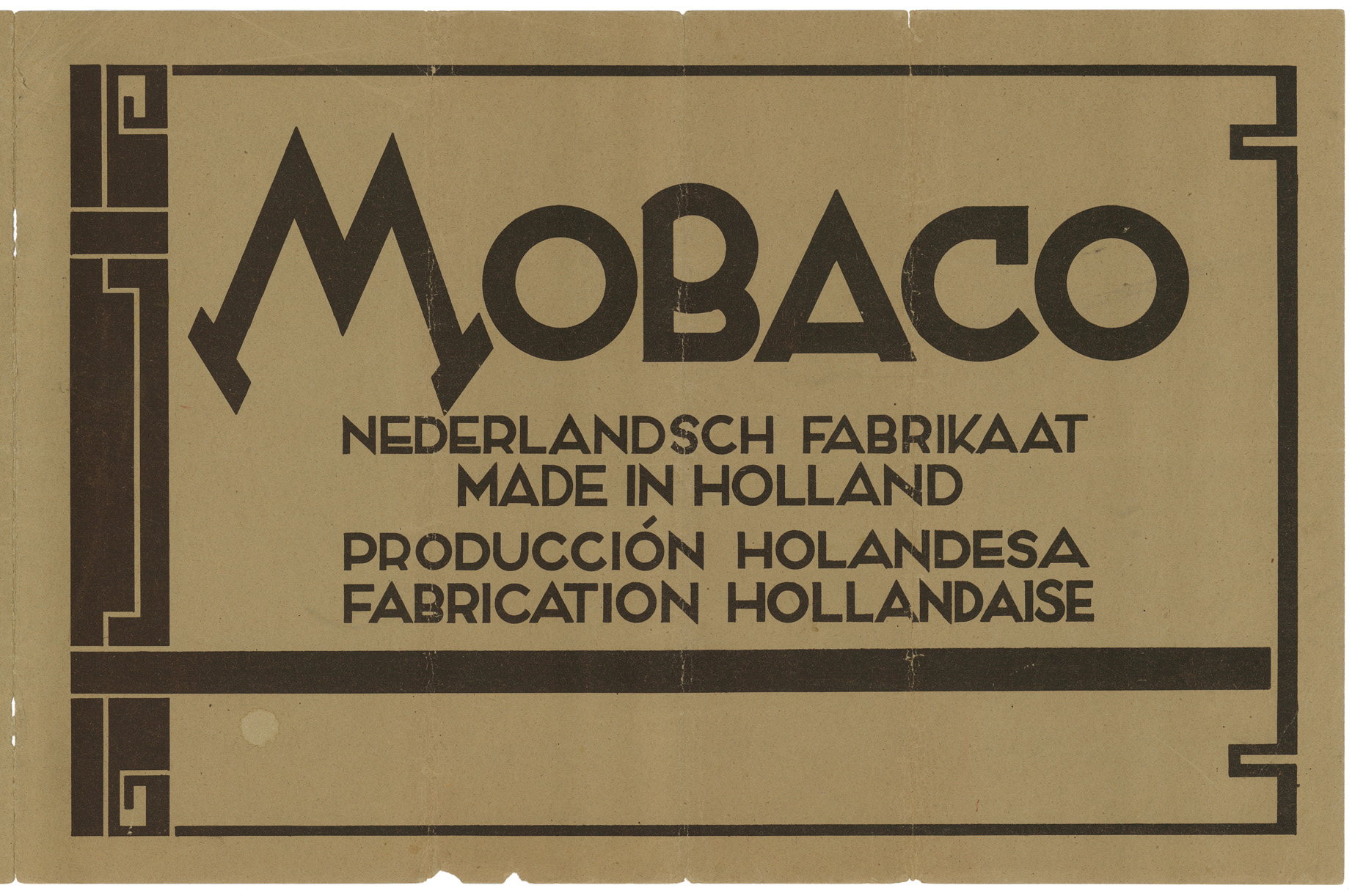 |
||||||||||||||||||||||||||||||||||||||||||||||||||||||||||||||||||||||||||||||||||||||||||||||||||||||||||||||||||||||||||||||||||||||||||||||||||||||||||||||||||
Note: thumbnails below are shown at 90%
relative to other thumbnails on this web page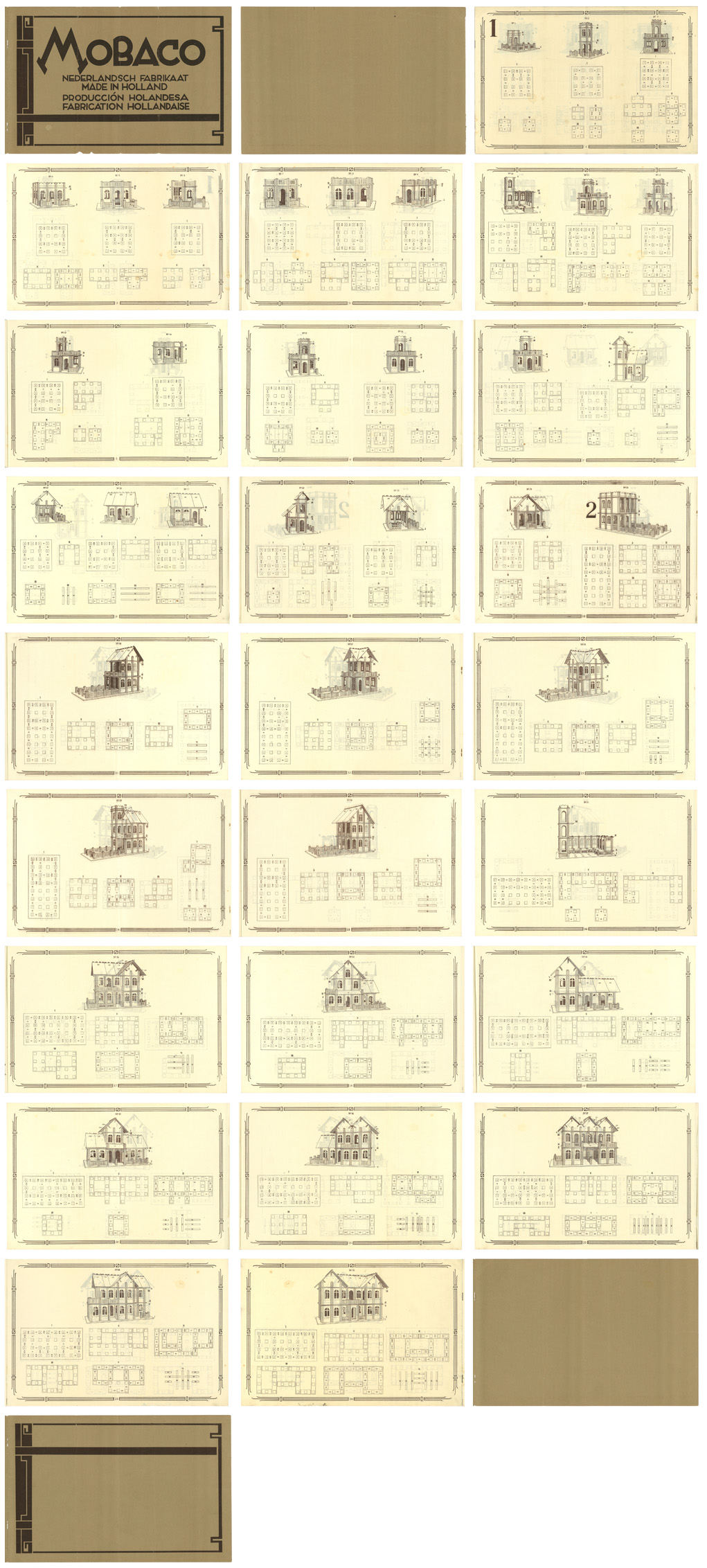 Manual courtesy Leen Kalden 1931 - SET 1-4 MANUAL (WITH GNOMES, ROUND WINDOWS) |
||||||||||||||||||||||||||||||||||||||||||||||||||||||||||||||||||||||||||||||||||||||||||||||||||||||||||||||||||||||||||||||||||||||||||||||||||||||||||||||||||
| The manual to end all manuals!
With a colorful cover and totaling 76 pages
(including covers), this is the manual most
pre-war children aspired to. This manual is included with Sets 1, 1a, 2, 3 and 4, and later in Set 2a as well. The book is a little larger than A4. It does not fit in Set No. 1, in which case it's folded down the middle. Moubal also came out with a smaller manual for Set 00-0-1. The book features 82 models, plus 8 illustrations without plans for Set 3 and even 3 illustrations for a Set 5. Set 5 was never released, but this indicates they had plans for such a monster set. Considering how few Set 4's were ever sold, that may have been a wise decision. Only a handful of Sets 4 are known, one of them at the Brighton Toy Museum. Interestingly, the designs for Set 5 feature square windows. So by the time this book was produced, they were already thinking about changing the windows from round to square. This is the first manual with cover illustrations by artist Eelco ten Harmsen van der Beek, who also made other illustrations for Moubal, including price lists, other manuals and marketing material. This marks a shift in Moubal's marketing strategy. Instead of focusing on the architectural aspects of the system, play value is emphasized. This manual includes designs for Train Station No. 2 (see designs no 60 and 60A). This station is also shown on the rear cover. The front cover appears to be a covered market. These illustrations are (partially) used in the Gnomes marketing brochure. The manual consists of 4 stapled booklets (16 pages each) that are glued to each-other and to the binding. The covers had a binding strip between the front and the rear cover to accommodate the thickness of the contents, see photo on the right. This manual was most likely introduced in the fall of 1931, at the same time as the Gnomes marketing brochure, which is mentioned in a Jaarbeurs (Trade Fair) article in September 1931. 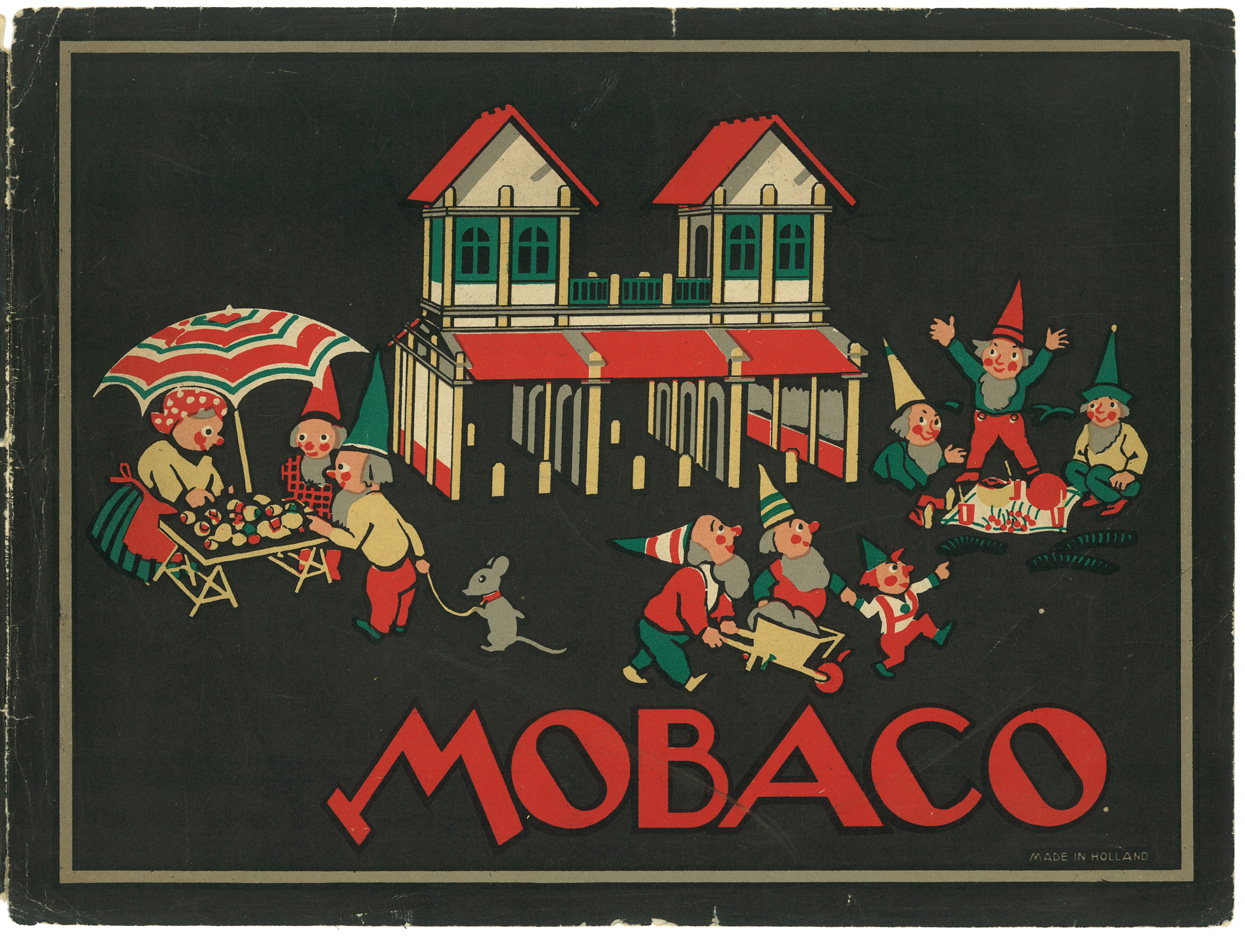 310 x 233 mm 74 pages (including covers) Color covers (black plus spot colors red, pink, green, gray, tan), and B&W inside 82 designs + 11 illustrations 24 for Set 1 16 for Set 2 22 (plus 8 extra) for Set 3 20 for Set 4 3 illustrations for Set 5 See pages DOWNLOAD PDF A3 (58 MB) DOWNLOAD PDF A4 (58 MB) |
|
|||||||||||||||||||||||||||||||||||||||||||||||||||||||||||||||||||||||||||||||||||||||||||||||||||||||||||||||||||||||||||||||||||||||||||||||||||||||||||||||||
 Manual courtesy Leen Kalden 1931 - SET 00 + 0 + 1 MANUAL (ROUND WINDOWS) |
||||||||||||||||||||||||||||||||||||||||||||||||||||||||||||||||||||||||||||||||||||||||||||||||||||||||||||||||||||||||||||||||||||||||||||||||||||||||||||||||||
This manual was
introduced in 1931, as can be seen in this
1931 photograph. The cover has round
windows, like the manual above, while the sets
contained square windows. The 24 designs for Set 1
are the same as in the large gnomes manual above, so
there is a 100% overlap between these manuals. 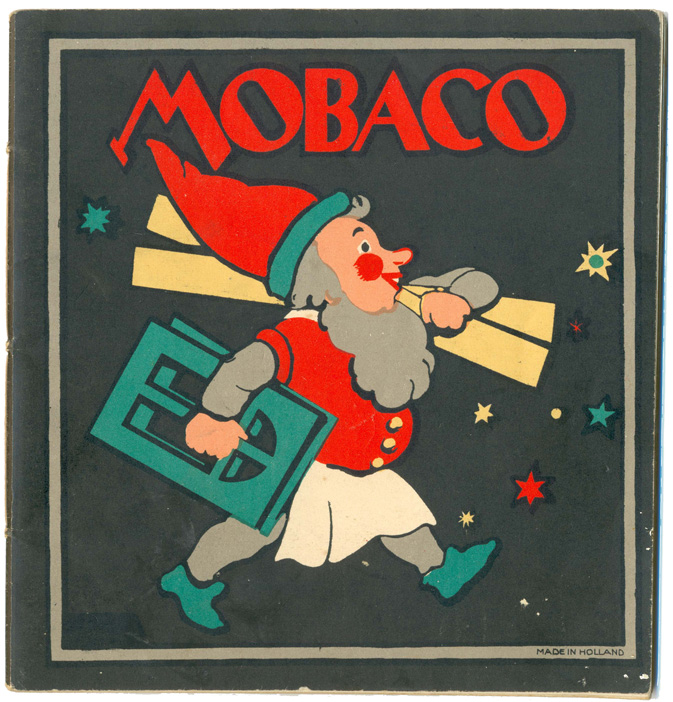 175 x 175 mm 44 pages (including covers) Covers: 6 spot colors (dark gray, light gray, red, pink, green, yellow) Inside: B&W 37 designs: 5 designs for Set 00 8 designs for Set 0 24 designs for Set 1 See pages DOWNLOAD PDF |
||||||||||||||||||||||||||||||||||||||||||||||||||||||||||||||||||||||||||||||||||||||||||||||||||||||||||||||||||||||||||||||||||||||||||||||||||||||||||||||||||
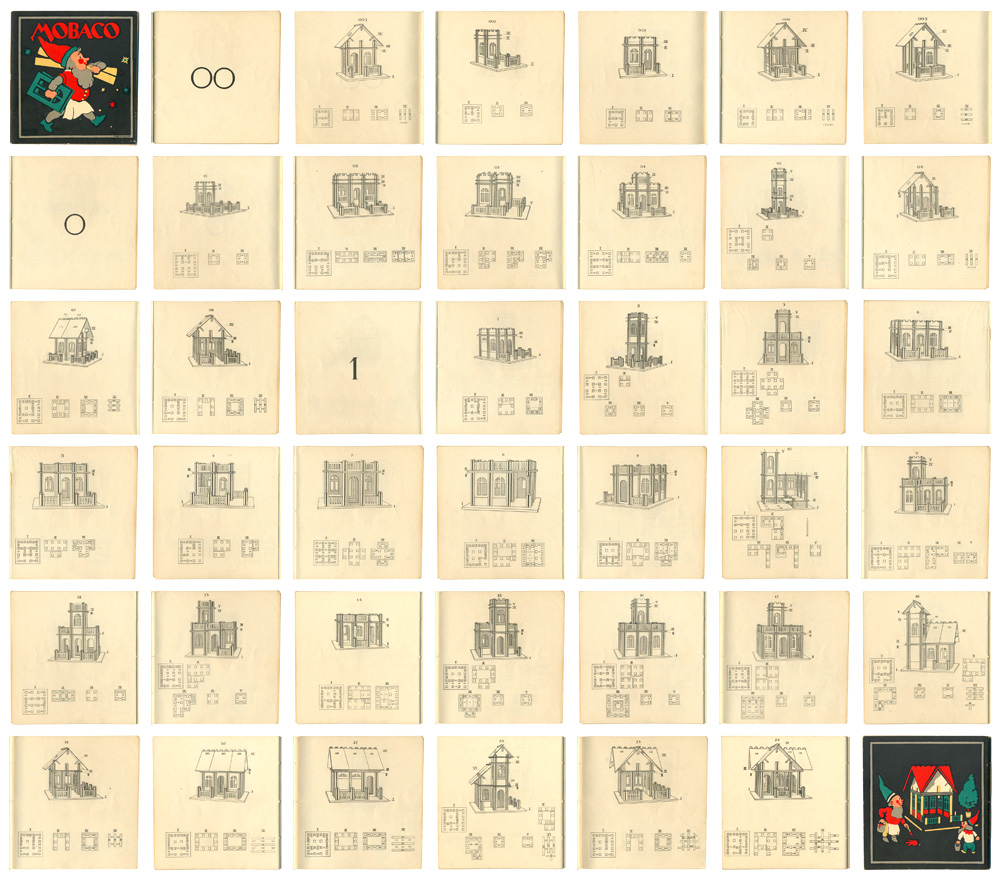 Scans courtesy Leen Kalden |
||||||||||||||||||||||||||||||||||||||||||||||||||||||||||||||||||||||||||||||||||||||||||||||||||||||||||||||||||||||||||||||||||||||||||||||||||||||||||||||||||
Alex Geelhoed found a B&W version of this same manual, with round windows. Although at first it appears to be a misprint, it is clear that it was intentional as there are extra lines for the lips, nose, cheek, buttons and hand. The rear cover doesn't have an image. The inside is identical to the above version. [Ter] Harmsen van [der] Beek's name is on the cover, while his name does not appear on any of the color versions of the manual. It is therefore likely an earlier version of the above manual. So far only two copies have been found, perhaps it was part of a trial run to see how the market would respond to gnomes? |
||||||||||||||||||||||||||||||||||||||||||||||||||||||||||||||||||||||||||||||||||||||||||||||||||||||||||||||||||||||||||||||||||||||||||||||||||||||||||||||||||
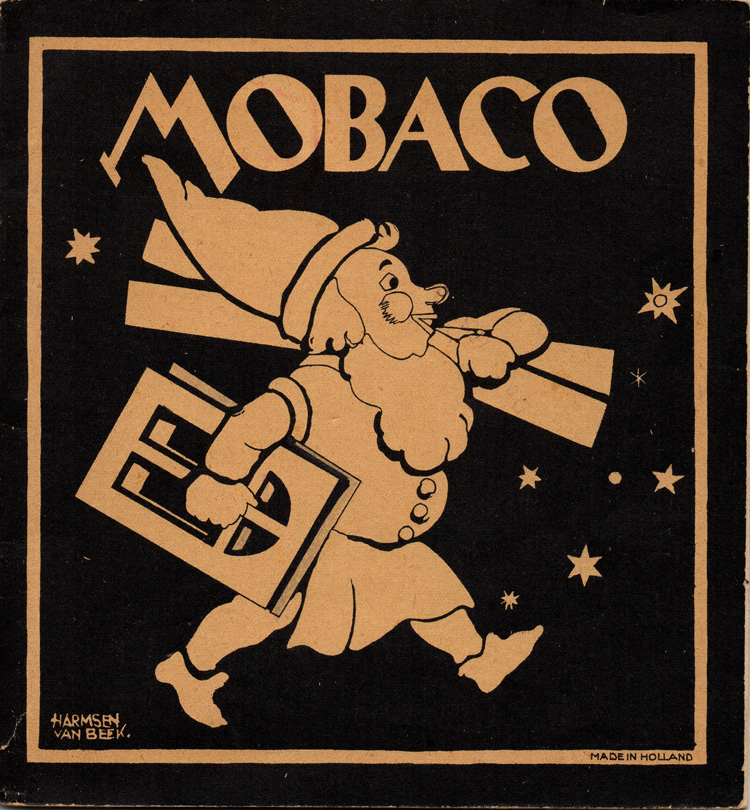 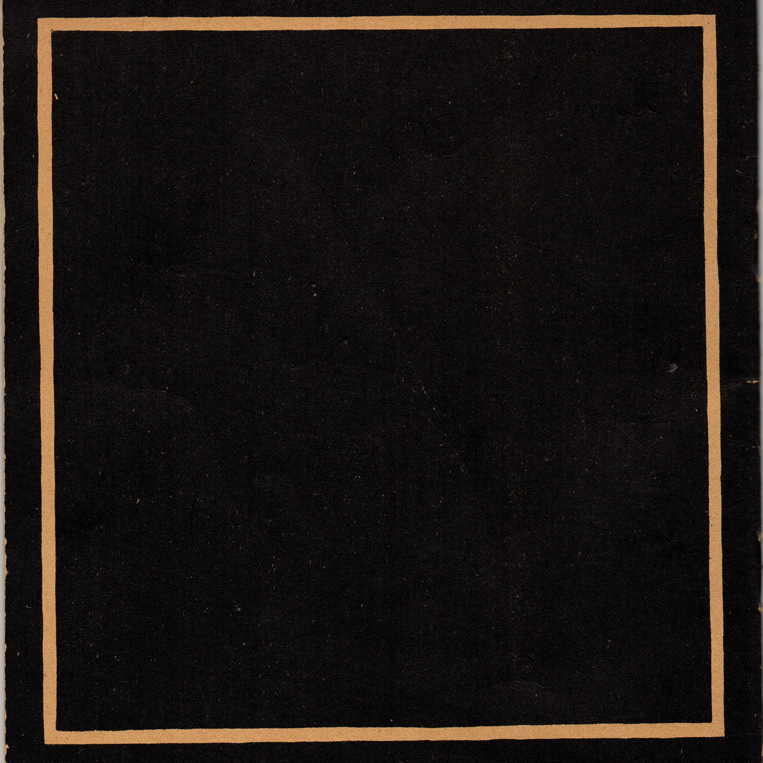 DOWNLOAD PDF |
||||||||||||||||||||||||||||||||||||||||||||||||||||||||||||||||||||||||||||||||||||||||||||||||||||||||||||||||||||||||||||||||||||||||||||||||||||||||||||||||||
| Scans
courtesy Alex Geelhoed 1932 or 1933 - SET 00 + 0 + 1 MANUAL (SQUARE WINDOWS) |
||||||||||||||||||||||||||||||||||||||||||||||||||||||||||||||||||||||||||||||||||||||||||||||||||||||||||||||||||||||||||||||||||||||||||||||||||||||||||||||||||
| This manual is
identical to the manual above, except the green
windows were changed from round top to square top.
This could have been as early as 1932, but also in
1933, when there is an ad featuring the exact same
image. There is a variation of this manual with a cover with square windows, but inside the drawings still show round windows. This "hybrid" version probably precedes the "correct" version with square windows inside. A cost saving measure? 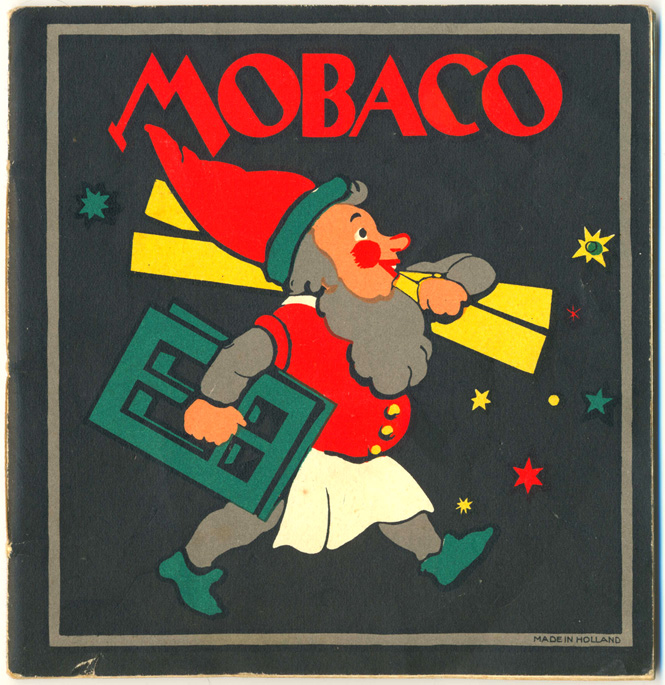
175 x 175 mm 44 pages (including covers) Covers: 6 spot colors (dark gray, light gray, red, pink, green, yellow) Inside: B&W 37 designs: 5 designs for Set 00 8 designs for Set 0 24 designs for Set 1 See pages DOWNLOAD PDF |
||||||||||||||||||||||||||||||||||||||||||||||||||||||||||||||||||||||||||||||||||||||||||||||||||||||||||||||||||||||||||||||||||||||||||||||||||||||||||||||||||
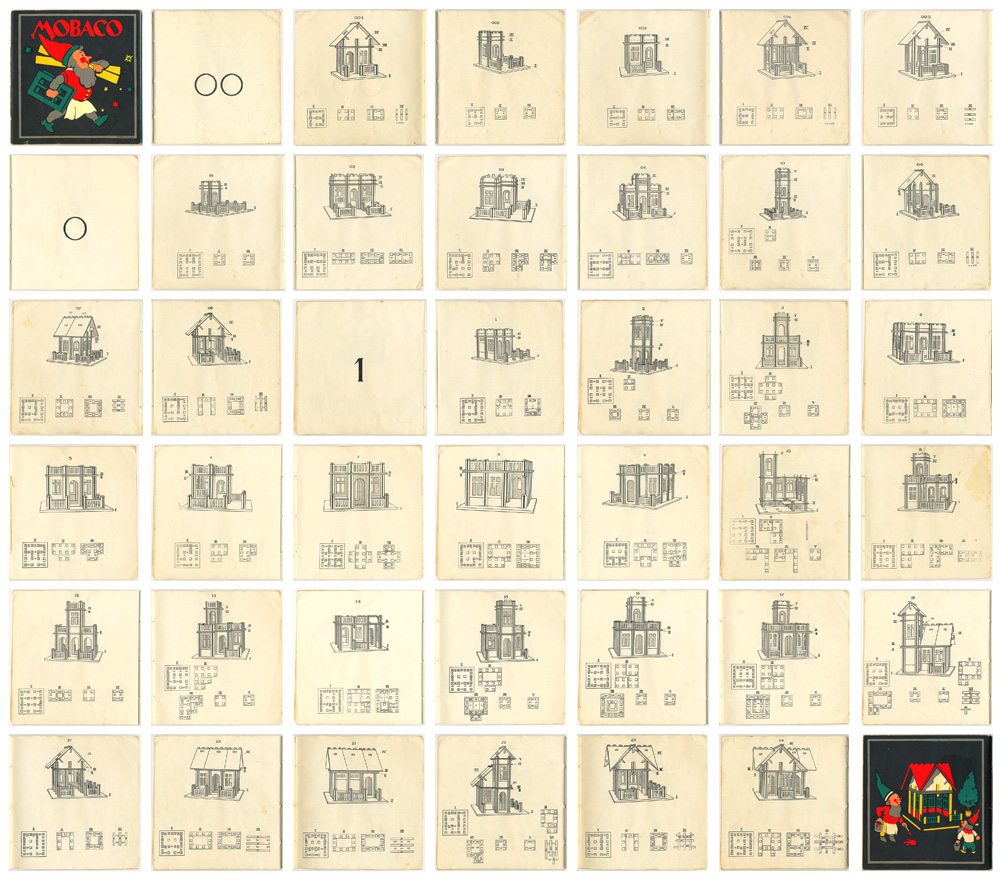 Scans courtesy Leen Kalden |
||||||||||||||||||||||||||||||||||||||||||||||||||||||||||||||||||||||||||||||||||||||||||||||||||||||||||||||||||||||||||||||||||||||||||||||||||||||||||||||||||
1932 - SET 000 MANUAL (SQUARE WINDOWS) This is a simple fold-out sheet. Clearly a budget item. 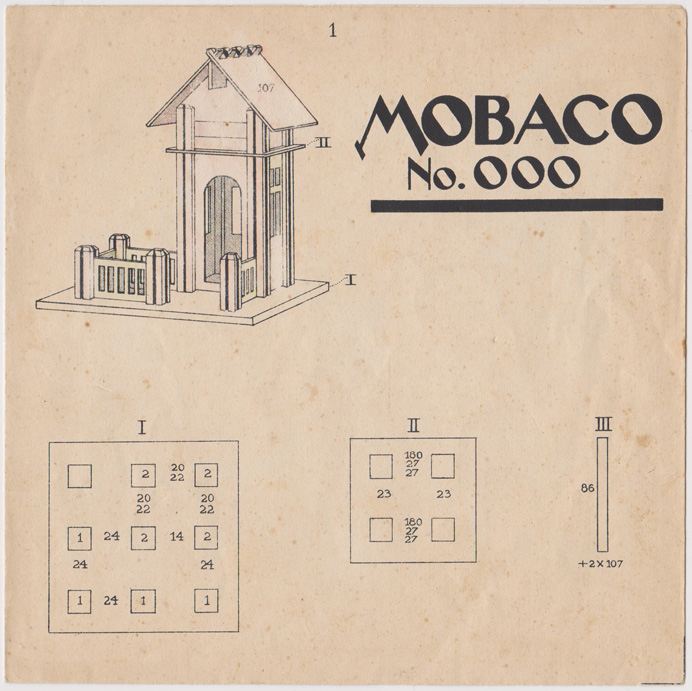 yyy
x yyy
mm
yyy
x yyy
mm4 pages B&W printing 4 designs See pages DOWNLOAD PDF |
||||||||||||||||||||||||||||||||||||||||||||||||||||||||||||||||||||||||||||||||||||||||||||||||||||||||||||||||||||||||||||||||||||||||||||||||||||||||||||||||||
 Scans courtesy Leen Kalden |
||||||||||||||||||||||||||||||||||||||||||||||||||||||||||||||||||||||||||||||||||||||||||||||||||||||||||||||||||||||||||||||||||||||||||||||||||||||||||||||||||
1935 - GARAGE No. 1 MANUAL 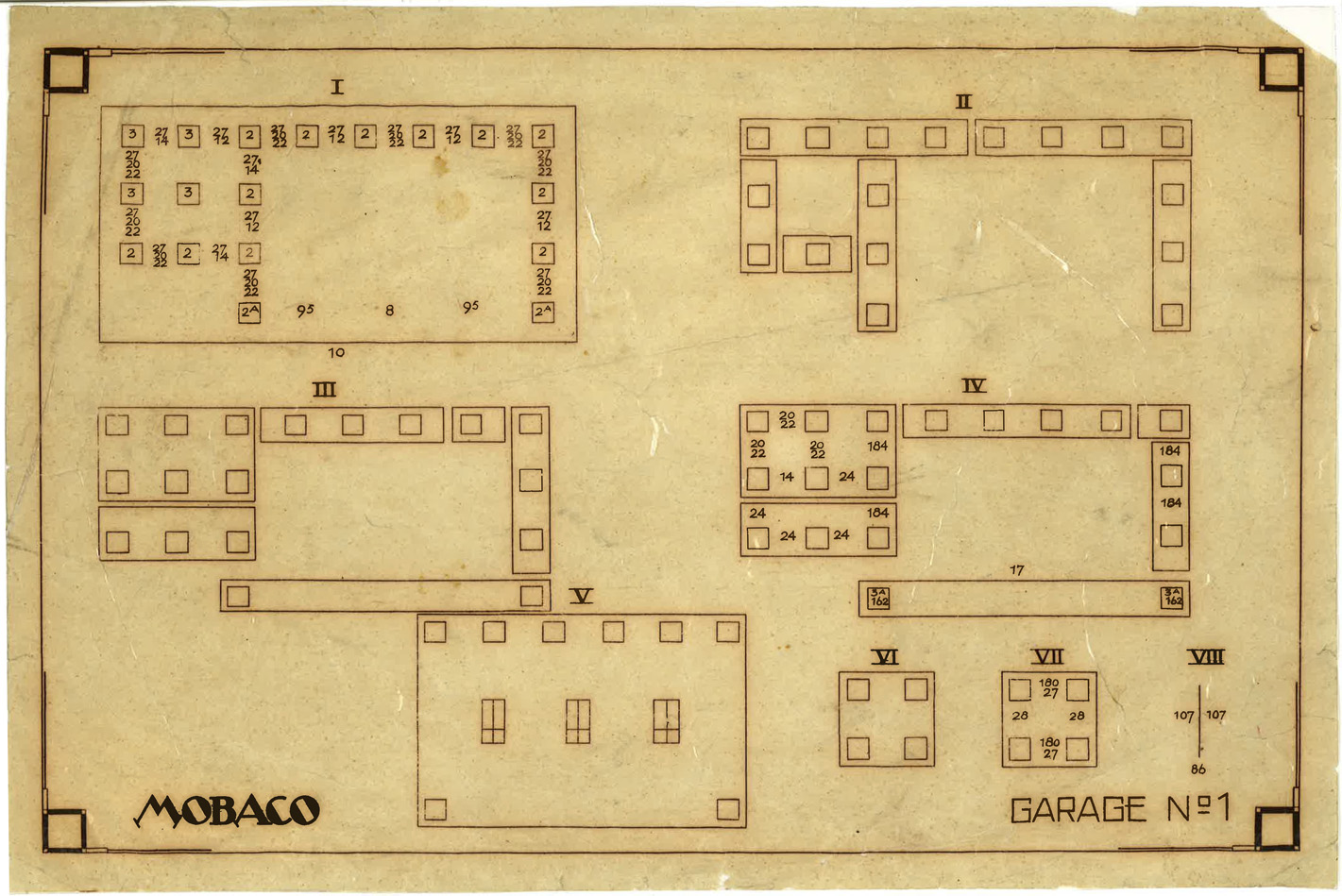 358 x 239 mm 1 page B&W printing 1 design See page DOWNLOAD PDF |
||||||||||||||||||||||||||||||||||||||||||||||||||||||||||||||||||||||||||||||||||||||||||||||||||||||||||||||||||||||||||||||||||||||||||||||||||||||||||||||||||
| Scan courtesy Henri de Graaf | ||||||||||||||||||||||||||||||||||||||||||||||||||||||||||||||||||||||||||||||||||||||||||||||||||||||||||||||||||||||||||||||||||||||||||||||||||||||||||||||||||
1935 - GARAGE No. 2 MANUAL 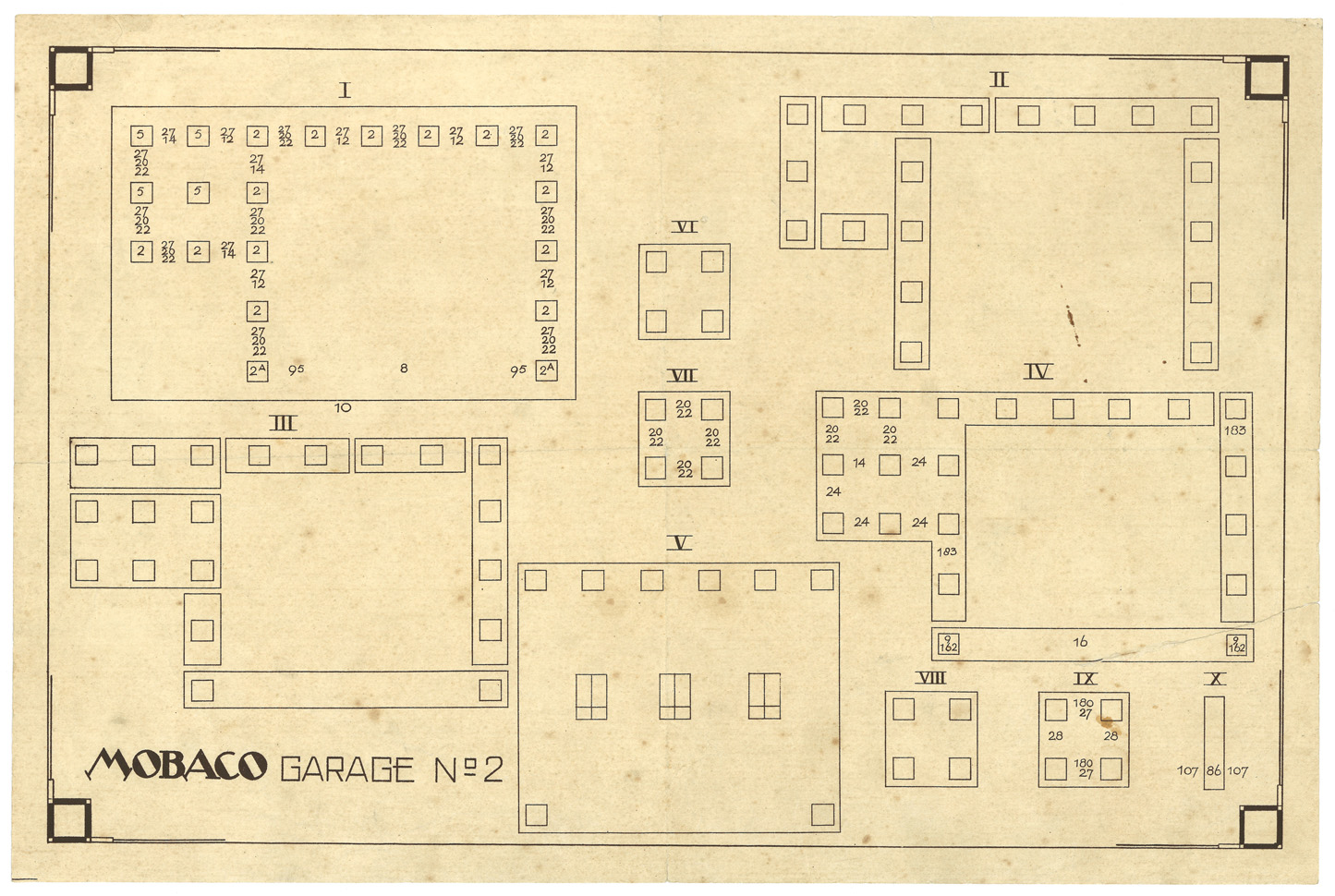 359 x 238 mm 1 page B&W printing 1 design See page DOWNLOAD PDF |
||||||||||||||||||||||||||||||||||||||||||||||||||||||||||||||||||||||||||||||||||||||||||||||||||||||||||||||||||||||||||||||||||||||||||||||||||||||||||||||||||
| Scans courtesy Leen Kalden | ||||||||||||||||||||||||||||||||||||||||||||||||||||||||||||||||||||||||||||||||||||||||||||||||||||||||||||||||||||||||||||||||||||||||||||||||||||||||||||||||||
1936 - WINDMILL No.1 and No. 2 MANUAL The same one-page instruction leaflet was used in both windmill sets. Note that in the illustration, the windmill is assembled incorrectly. The larger octagonal ground plate should be used on the upper level, as that is where the miller would walk to adjust the orientation of the sails. Fortunately, the written instructions explain it correctly. Although the windmills are technically not a Mobaco product (the name does not appear on the boxes), it was compatible with Mobaco. The leaflet explains that the the manufacturer of MOBACO intends to create a series of typical Dutch buildings made with the same dense cardboard as Mobaco, and that the first such sets are the small and large windmill. Unless you count ELBA which came out in 1940, there are no known other sets that came out in this line. The illustration on the price lists starting in 1937 features a small village with a windmill, a sailing boat, a draw bridge and lots of trees, suggesting that perhaps that's what they had in mind. A draw bridge was never made, nor was a sailing boat, but they did indeed make short and tall trees starting in 1949 for the Jumbo Mobaco sets. DATING The instruction leaflet is not dated, but most coincide with the introduction of the windmill sets which was probably 1936. Based on newspaper ads, it appears the windmill sets were only produced for two years, in 1936 and 1937. 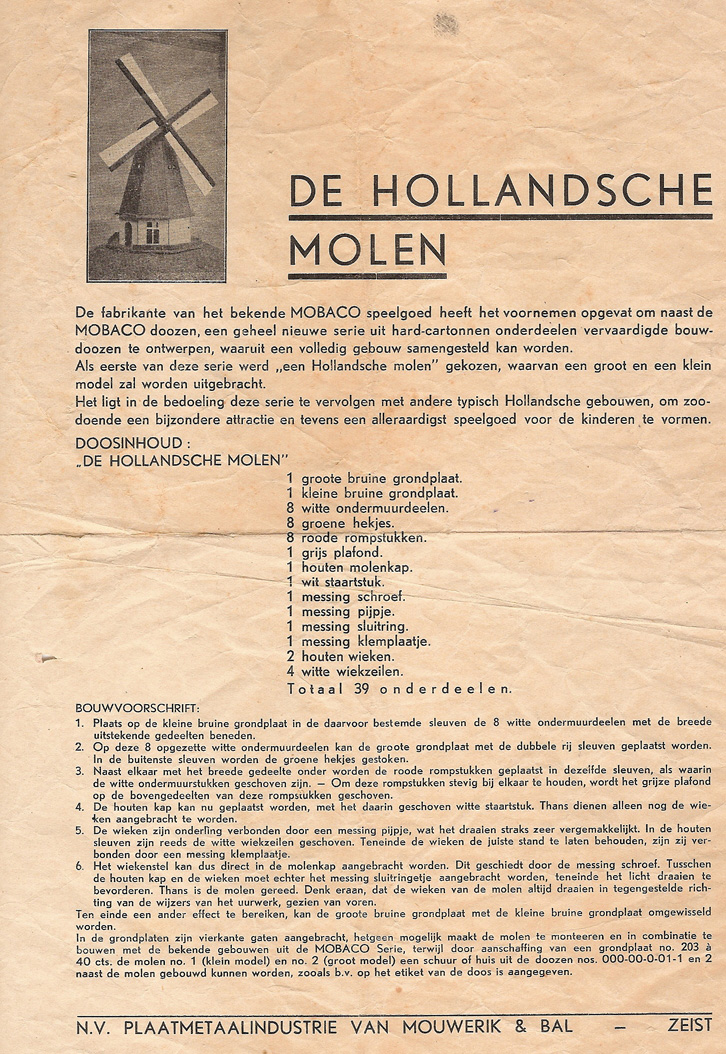 210 x 297 mm (verify) 1 page B&W printing 1 design See page DOWNLOAD PDF |
||||||||||||||||||||||||||||||||||||||||||||||||||||||||||||||||||||||||||||||||||||||||||||||||||||||||||||||||||||||||||||||||||||||||||||||||||||||||||||||||||
| Scan courtesy
Henri de Graaf 1936-1952 OVERVIEW RED & BLACK MANUALS |
||||||||||||||||||||||||||||||||||||||||||||||||||||||||||||||||||||||||||||||||||||||||||||||||||||||||||||||||||||||||||||||||||||||||||||||||||||||||||||||||||
| Probably as a cost-saving measure, the
44-page book for Sets 00+0+1 is split into two smaller
books, one for Set 00 with 8 pages, and one for Sets 0 and
1 with 20 pages. The covers are reduced from 6 spot colors
to just 2 (red and black). The budget booklet for Set 00 includes all 5 designs for Set 00 from the older Set 00+0+1 booklet. The budget booklet for Sets 0 and 1 includes all 8 designs for Set 0 shown in the earlier book for Sets 00+0+1, but only 5 of the 24 designs for Set 1, specifically designs no. 2, 12, 18, 19 and 24. Why only these five? That's because in 1936 Moubal reduced the number of parts in Set 1 from 252 to 174, and these five are the only models you can build with the reduced parts count. With some minor modifications some of the other models could have been built as well, but apparently Moubal did not want to revise the drawings. The necessity of an adjusted manual may have been the impetus to split the manual into two smaller manuals and simplify the cover to just red and black. On the inside of the front cover, there is now a one-page explanation on how to build a Mobaco house. The text is identical to the loose-leaf instructions that were used from ±1931 through 1935 (see further below). The reduction in number of parts/models and the inclusion of the instructions are why we believe that these budget booklets came out in 1936. These booklets were in use until the last Moubal sets were made in 1952. Although the booklets look identical, careful observation shows us that there are small variations which allow us to possibly further date these booklets and the boxes they were in. The two easiest differences are spelling of the instructions and K2384 on the rear cover: 1. SPELLING OF THE INSTRUCTIONS ON PAGE 2: The most obvious evolution is the spelling used in the instructions. First they have "old" Dutch spelling, after ±1948 they have new spelling. It is easy to recognize which version you hold: if the first word is "Zooals" (with two o's) then it's old spelling, if it is "Zoals" it's new spelling. 2. K2384 ON REAR COVER: During World War II (1940-1945), the occupier required all printers to identify their print work with their name or a "K"-number ("K-nummer or Kennummer"), in this case K2384, shown on the rear cover. The decree of 15 July 1941 to limit paper consumption read: Print manufacturers must affix their company name or identification number to all paper and cardboard products that are printed by them. The identification number will be sent to them on request by the Rijksbureau voor de Verwerkende Industrieën, Sectie Grafische Industrie (National Office for the Processing Industries, Graphics Industry Section) and appears on a list which is held by this National Office.This even applied to family printed matter. The list of K-numbers was lost, but in the 1990's someone found a hand-written list with many of the numbers. Unfortunately K2384 is blank. I did a fair amount of research on who K2384 might be, and had narrowed it down to three candidates: "N.V. Boekdrukkerij voorheen L. van Nifterik", located at Oude Gracht 172, Utrecht, "Handelsmaatschappij Nitor N.V.", located along the same canal at Oude Gracht 201, Utrecht, and "N.V. Utrechtse Drukkerij voorheen Nout & Co", Kanaalweg 21, Utrecht. Then in 2023 Leen Kalden found a clipping which mentions that the colorful gnome catalog was printed by Nout en Co. in Utrecht. From De reclame - Orgaan voor reclame en reclamekunst of 1 October 1931: 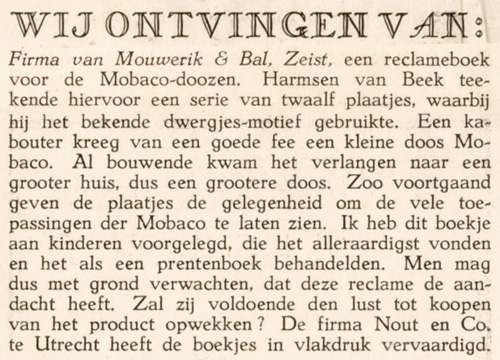 Courtesy of delpher.nl via Leen Kalden Nout & Co. most likely also printed the instruction manuals with the gnomes on them (the paper and printing look identical), including these manuals. After an extended search we found two accounting ledgers from Nout & Co in the archives of the city of Utrecht (Het Utrechts Archief) confirming that Moubal was a client. We also found printwork for another client featuring K2384 whose name we found in the ledgers, confirming that K2384 is indeed N.V. Utrechtse Drukkerij voorheen Nout & Co. These ledgers also show us that they did print work for Moubal in the fall of 1941 and the spring of 1942, and nothing after that in 1942 and nothing in 1943 (and probably also not until after the war). With these two identifiers we split up these booklets into 3 main periods: - Pre-war booklets with old spelling - 1936 through early 1941 - War booklets with old spelling and K2384 - fall 1941 and spring 1942 - Post-war booklets with new spelling - 1948 through 1952 Note that in some boxes sold after the war there are manuals and labels with K-numbers, likely left-over stock from the war period. As the detailed analysis below shows, there were many variations of the "0 EN 1" manual, but just a few of the 00 manual. |
||||||||||||||||||||||||||||||||||||||||||||||||||||||||||||||||||||||||||||||||||||||||||||||||||||||||||||||||||||||||||||||||||||||||||||||||||||||||||||||||||
1936-1952 - OVERVIEW RED & BLACK "00" MANUALS |
||||||||||||||||||||||||||||||||||||||||||||||||||||||||||||||||||||||||||||||||||||||||||||||||||||||||||||||||||||||||||||||||||||||||||||||||||||||||||||||||||
| In addition to old or new spelling and the
K2384 identifier, there are several other variations that
help identify the variations: [ANALYSIS IN PROGRESS] |
||||||||||||||||||||||||||||||||||||||||||||||||||||||||||||||||||||||||||||||||||||||||||||||||||||||||||||||||||||||||||||||||||||||||||||||||||||||||||||||||||
SET 00 MANUAL (OLD SPELLING) WITH K2384 - 1941 OR 1942 |
||||||||||||||||||||||||||||||||||||||||||||||||||||||||||||||||||||||||||||||||||||||||||||||||||||||||||||||||||||||||||||||||||||||||||||||||||||||||||||||||||
| This booklet is from the war. DATING This manual could be from either late 1941 (after the decree was issued on 15 July 1941) or early 1942. K-numbers were in force through appr. 1947, but many printers stopped using them directly after the war in 1945. As far as we know, production of Mobaco stopped around 1942, and it wasn't available again until early 1948. There are post-war sets that still have manuals and labels with K-numbers, presumably from old stock. However newly printed manuals after the war had modern spelling. 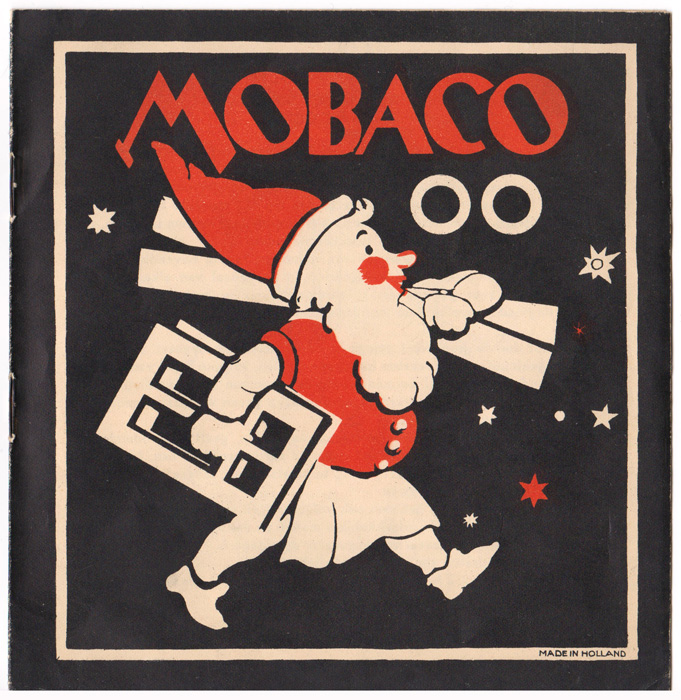 167 x 175 mm 8 pages (including covers) B&W printing + red spot color on covers 5 designs See pages DOWNLOAD PDF |
||||||||||||||||||||||||||||||||||||||||||||||||||||||||||||||||||||||||||||||||||||||||||||||||||||||||||||||||||||||||||||||||||||||||||||||||||||||||||||||||||
 Scans courtesy Leen Kalden SET 00 MANUAL (NEW SPELLING) - SOMEWHERE 1948 - 1952 |
||||||||||||||||||||||||||||||||||||||||||||||||||||||||||||||||||||||||||||||||||||||||||||||||||||||||||||||||||||||||||||||||||||||||||||||||||||||||||||||||||
| This is a post-war manual with the
Instructions on page 2 using modern Dutch spelling Note that there are post-war sets that still have manuals and labels with K-numbers, those are presumably from old stock. 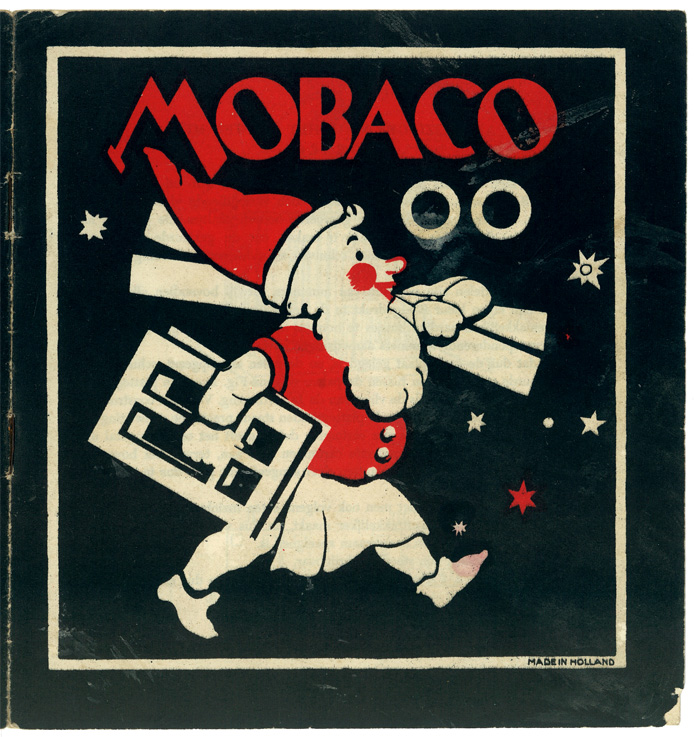 171 x 182 mm 8 pages (including covers) B&W printing + red spot color on covers 5 designs See pages DOWNLOAD PDF |
||||||||||||||||||||||||||||||||||||||||||||||||||||||||||||||||||||||||||||||||||||||||||||||||||||||||||||||||||||||||||||||||||||||||||||||||||||||||||||||||||
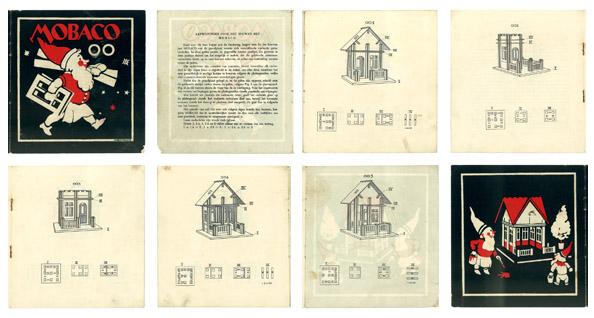 Manual courtesy of Leen Kalden 1936-1952 - OVERVIEW RED & BLACK "0 AND 1" MANUALS |
||||||||||||||||||||||||||||||||||||||||||||||||||||||||||||||||||||||||||||||||||||||||||||||||||||||||||||||||||||||||||||||||||||||||||||||||||||||||||||||||||
| In addition to old or new spelling and the
K2384 identifier, there are several other variations that
help identify the many variations of the "0 and 1" manual.
The table below shows all known variations. 1. Typography of the "0 EN 1" on the front cover: The letters of the word EN vary quite a bit, as does the shape of the 1. There is generally a good correlation between the 1 on the cover and the 1 on page 12. 2. Typography of the number 0 on page 3 3. Typography of the number 1 on page 12 4. Distance between illustrations on pages 10 & 11 (center pages): this is easily identified by measuring the distance between the left edges of the ground plates of models 07 and 08:    6. Design of the hand holding the
window on the front cover: On all covers, the
hand looks identical, except the very last version
where there is an outline of the fingers. Left the
normal version, right the version with an outline:
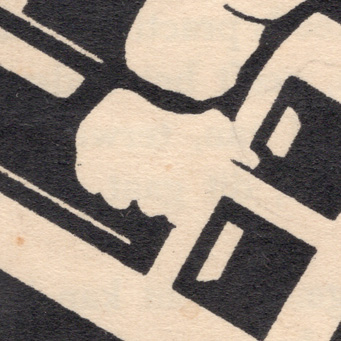
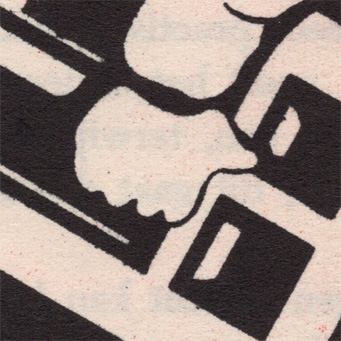 7. Size of booklet
DATING: We found 14 variations. This booklet was in use in for 12 years: 1936, 1937, 1938, 1939, 1940, 1941, 1942, 1948, 1949, 1950, 1951 and 1952. In 1941 there were probably two printings, one without a K-number and one with a K-number, and in 1942 possibly 2 print runs (as there are three variations with K-numbers) making the total number of print runs 14. It is probably no coincidence that there are as many variations as there are printings. This was a way to identify print runs without putting a date on the book. Or perhaps it was a running joke between the printer and Moubal?! So far we don't know the dates of each variation, but we hope to eventually find enough "uncontaminated" boxes with a dated price list and these manuals to be able to date (some of) them. Here what we found so far: - An "A" was found with an October 1936 price list, and this is probably the first version. This box has the Harmsen van Beek drawing with playing children on the lid, Néerlandais with an accent, Produccion without an accent, and brown "ostritch" paper under the lower box. A "D" was found in a similar box but with '38 and '39 price lists, but that box appears to be contaminated. - A "B" was found with a 5 July 1941 price list. This box has the Harmsen van Beek drawing with playing children on the lid, Neerlandais and Produccion without accents, and orange "wood grain" paper under the lower box. That would suggest that B was the last pre-war version (although the war had already started, but K-numbers were not yet compulsory until 10 days later). - A "J" was found in Set 01 without a price list which appears to be put together shortly after the war with left-over materials. It has dark-green imprint on the lid with ZHC-P and oak columns, typical of war sets, but has normal cardboard parts, a ground plate with circle imprints and black corner reinforcements at the bottom box, all typical of post-war sets. It also has a contents diagram without K-number. So J may be the first post-war version. |
||||||||||||||||||||||||||||||||||||||||||||||||||||||||||||||||||||||||||||||||||||||||||||||||||||||||||||||||||||||||||||||||||||||||||||||||||||||||||||||||||
|
||||||||||||||||||||||||||||||||||||||||||||||||||||||||||||||||||||||||||||||||||||||||||||||||||||||||||||||||||||||||||||||||||||||||||||||||||||||||||||||||||
| Below some examples
of "0 EN 1" booklets. SET 0 & 1 - OLD SPELLING, TYPE C - BETWEEN 1936 & 1941 |
||||||||||||||||||||||||||||||||||||||||||||||||||||||||||||||||||||||||||||||||||||||||||||||||||||||||||||||||||||||||||||||||||||||||||||||||||||||||||||||||||
| DATING This booklet is of Type C. We have not found a box yet with this manual and a dated price list, so for now all we know is that this version must be from somewhere between 1936 and spring 1941. 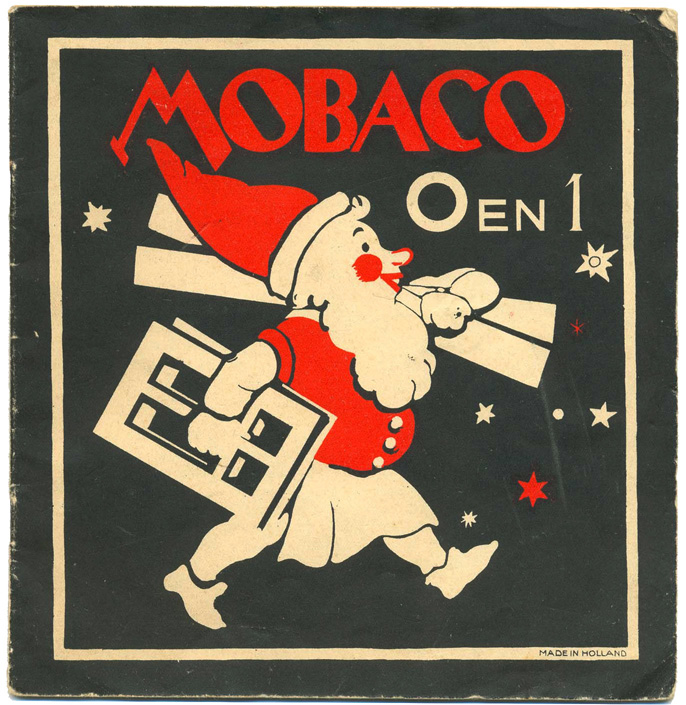 167 x 175 mm 20 pages (including covers), of which 2 are blank B&W printing + red spot color on cover 13 designs: - 8 designs for Set 0 - 5 designs for Set 1 See pages DOWNLOAD PDF |
||||||||||||||||||||||||||||||||||||||||||||||||||||||||||||||||||||||||||||||||||||||||||||||||||||||||||||||||||||||||||||||||||||||||||||||||||||||||||||||||||
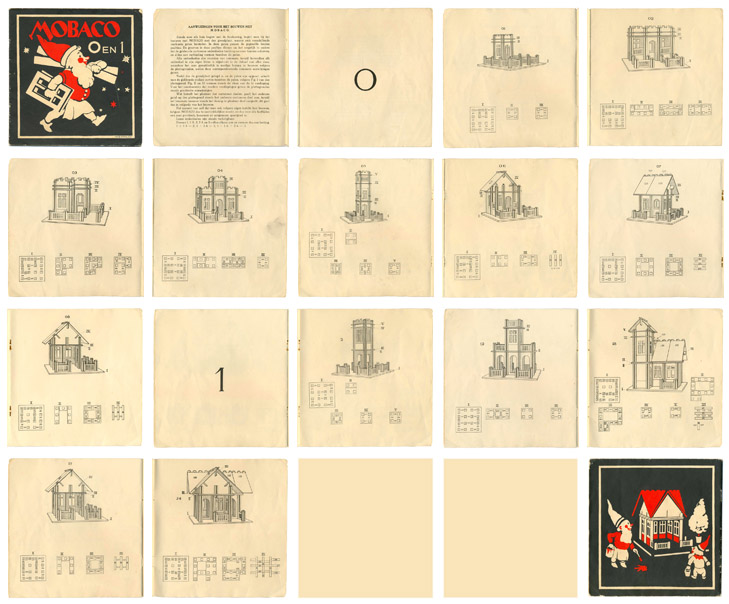
Scans courtesy of Leen Kalden |
||||||||||||||||||||||||||||||||||||||||||||||||||||||||||||||||||||||||||||||||||||||||||||||||||||||||||||||||||||||||||||||||||||||||||||||||||||||||||||||||||
| SET 0 & 1 - NEW SPELLING, TYPE M - PROBABLY 1952 |
||||||||||||||||||||||||||||||||||||||||||||||||||||||||||||||||||||||||||||||||||||||||||||||||||||||||||||||||||||||||||||||||||||||||||||||||||||||||||||||||||
| DATING The gnome's hand on the cover has an outline. This is probably the last version of this booklet, which must be from 1952, the last year Moubal Mobaco was sold. 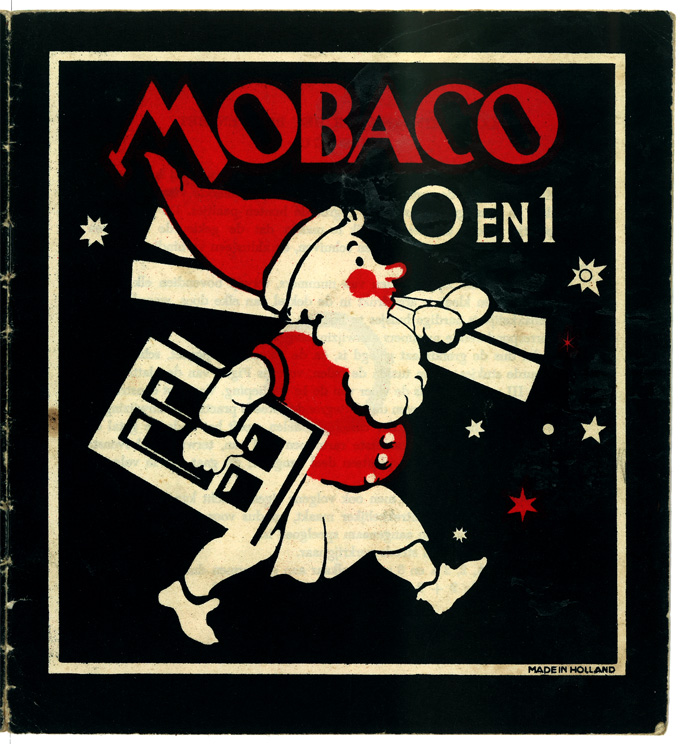 168 x 184 mm 20 pages (including covers and two blank pages) B&W printing + red spot color on covers 13 designs: - 8 designs for Set 0 - 5 designs for Set 1 See pages DOWNLOAD PDF |
||||||||||||||||||||||||||||||||||||||||||||||||||||||||||||||||||||||||||||||||||||||||||||||||||||||||||||||||||||||||||||||||||||||||||||||||||||||||||||||||||
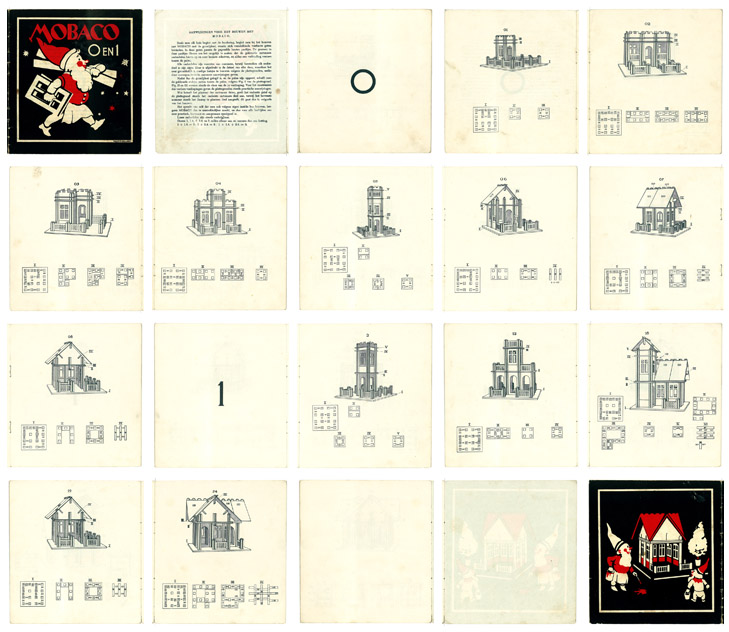 Manual courtesy Leen Kalden 1938 - SMALL GARAGE MANUAL |
||||||||||||||||||||||||||||||||||||||||||||||||||||||||||||||||||||||||||||||||||||||||||||||||||||||||||||||||||||||||||||||||||||||||||||||||||||||||||||||||||
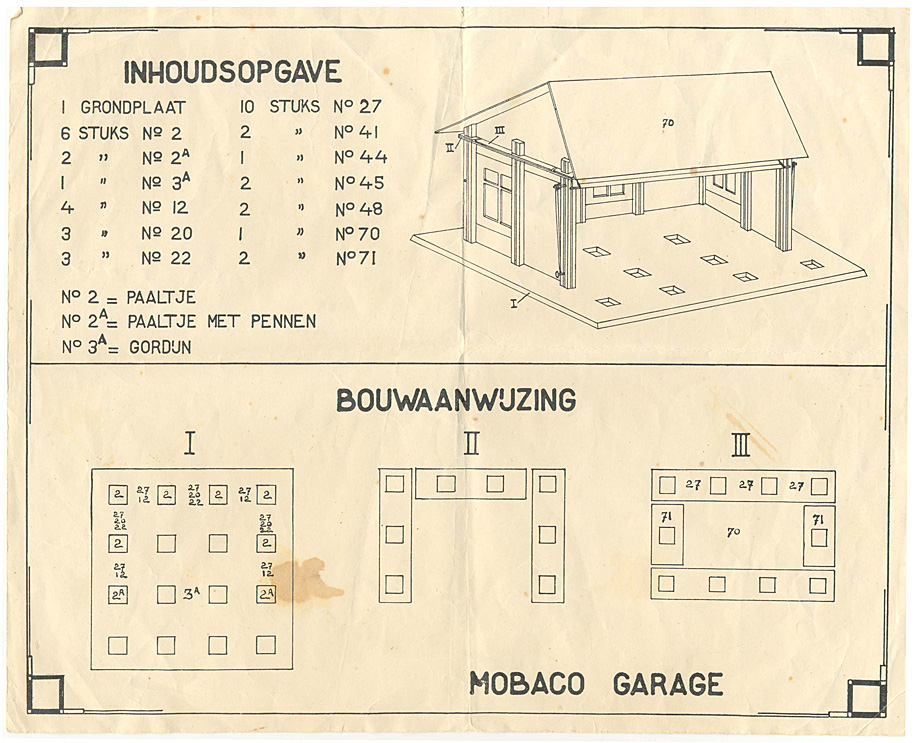 228 x 186 mm 1 page B&W printing 1 design See page DOWNLOAD PDF |
||||||||||||||||||||||||||||||||||||||||||||||||||||||||||||||||||||||||||||||||||||||||||||||||||||||||||||||||||||||||||||||||||||||||||||||||||||||||||||||||||
| Scan courtesy Leen Kalden INSTRUCTION LEAFLETS - 1931-1935, 1940 & 1948-1952 |
||||||||||||||||||||||||||||||||||||||||||||||||||||||||||||||||||||||||||||||||||||||||||||||||||||||||||||||||||||||||||||||||||||||||||||||||||||||||||||||||||
| The leaflets below
describe how to read the drawings and put
a model together. Some are undated and some have a printer code indicating the date and quantity printed. The text in all of them is identical except for one word on the second line which can be "verschillende" or "verscheidene" (which can both be translated as "various"). The same instructions appear in pre- and post-war 00 and 0+1 manuals, which all have the "verschillende" version, while most loose-leaf versions from the same period use "verscheidene". So far, these versions have been found, including in French and English: - Old spelling (pre-war) - Undated 1a with "verschillende", no print code - Undated 1b with "verschillende", no print code - Undated 2 with "verscheidene", no print code - 1934-11 with "verscheidene", 2,500 copies, print code E - 1935-02 with "verscheidene", 2,500 copies, print code E - 1935-09 with "verscheidene", 5,000 copies, print code W - 1935-10 with "verscheidene", 5,000 copies, print code W - 1935-11 with "verscheidene", 10,000 copies, print code W - 1940-06 with "verscheidene", 7,500 copies, print code W - English (pre-war) - undated, no print code - French (pre-war) - undated, no print code - New spelling (post-war) - undated with "verscheidene", no print code An exact copy of version 1a (with "verschillende" and the same line breaks) is used in the 00 en 0+1 manuals with the gnome on the cover (see above), so probably from the same printer, which would have been Nout & Co, Utrecht. A version using modern spelling (and still "verschillende") is included in 00 and 0+1 post-war manuals (see above). The printer codes have an E after them until February 1935, and a W after that. We have no clue what these mean. DATING In all versions, Set 2a is mentioned, so the leaflet must be from 1931 or later. Such a leaflet is shown being packed into Set 0 boxes in the 1931 article in Natuur & Techniek, so it was in use in 1931. In conclusion, this leaflet first came out in 1931. QUANTITIES PRINTED AND EXTRAPOLATION TO NUMBER OF SETS PRODUCED In 1935 there were 4 printings of this leaflet (found so far) with a total of 2,500 + 5,000 + 5,000 + 10,000 = 22,500 prints. Assuming they printed as many leaflets as needed to fill the boxes, we could assume that in 1935 they produced approximately 22,500 boxes. This is an interesting data point, as we have no records on the number of sets sold in the Moubal period. Another data point is 7,500 leaflets printed in June 1940, just after the start of the war (which started in May). These leaflets were for sets 000 and for sets 2 and above, as the same instructions were printed in the books for sets 00, 0 and 1. We may assume that the majority of what they sold after 1940 would be small sets, so these leaflets ended up mostly in Sets 000. Using these two data points and making some assumptions about the growth rate, I tried to calculate the number of sets made between 1924 and 1941 (when production likely stopped). I tried various scenarios, and the results generally fall between 160,000 and 200,000 sets. Here a medium growth version. Numbers in blue are inputs used for the calculations: 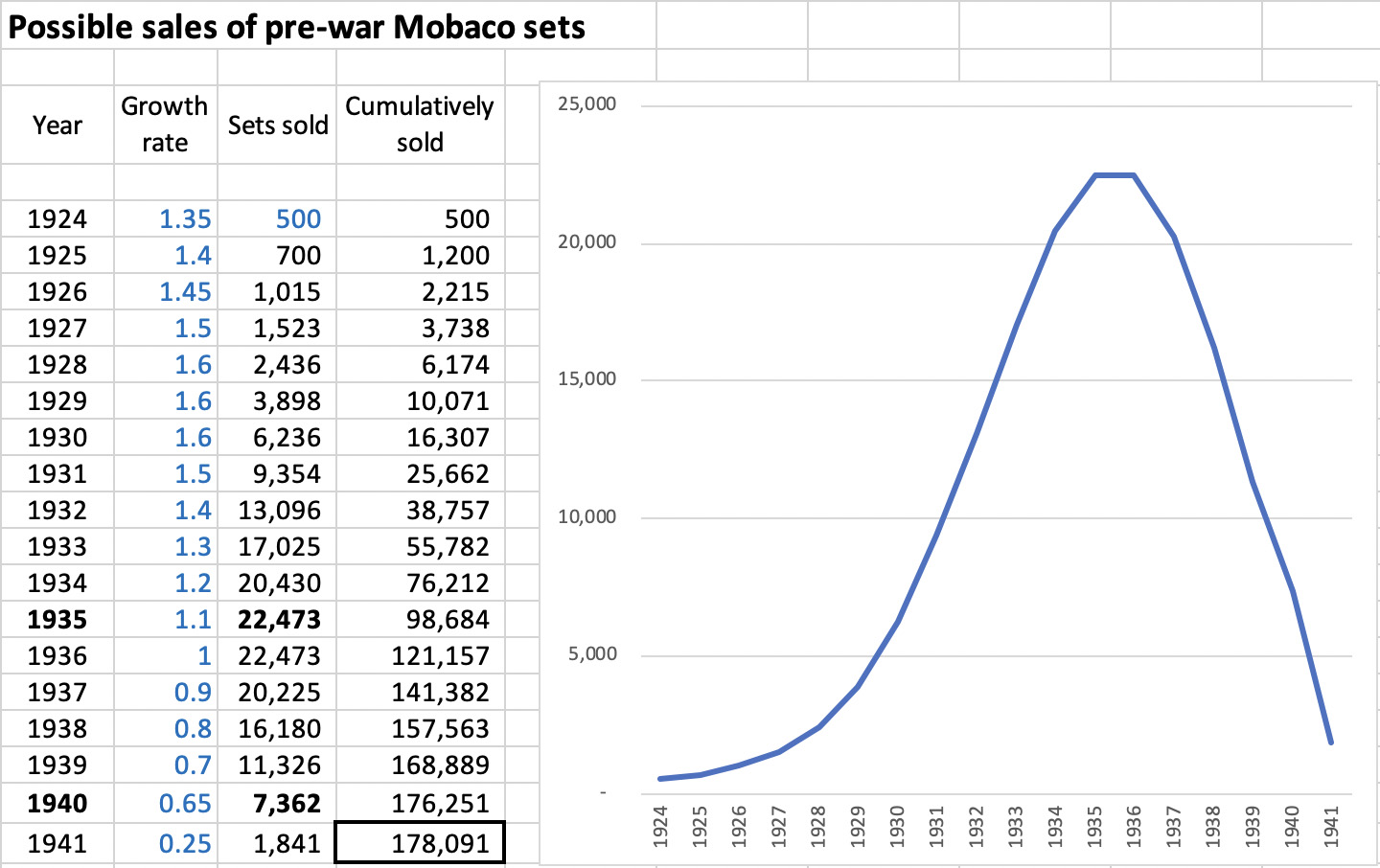 The number is much higher than I had expected. Of course this method is rife with uncertainties (!!), but may give some indication of what the sales numbers could have been. However, considering the terrible state of the economy at the time and the high unemployment rate in the mid- to late 1930's, it seems such high numbers are unlikely. Research on this topic continues. 1931(?) - UNDATED LEAFLET - OLD SPELLING - VERSION 1A This leaflet looks identical to Version 2, but upon close inspection it is slightly different: - the last word on the second line is "verschillende" while in the others it is "verscheidene". - it uses a slightly different font, resulting in different sentence breaks on three lines - the next to last line ends with a period. Starting in 1935 this period disappears This undated version could be from 1931. 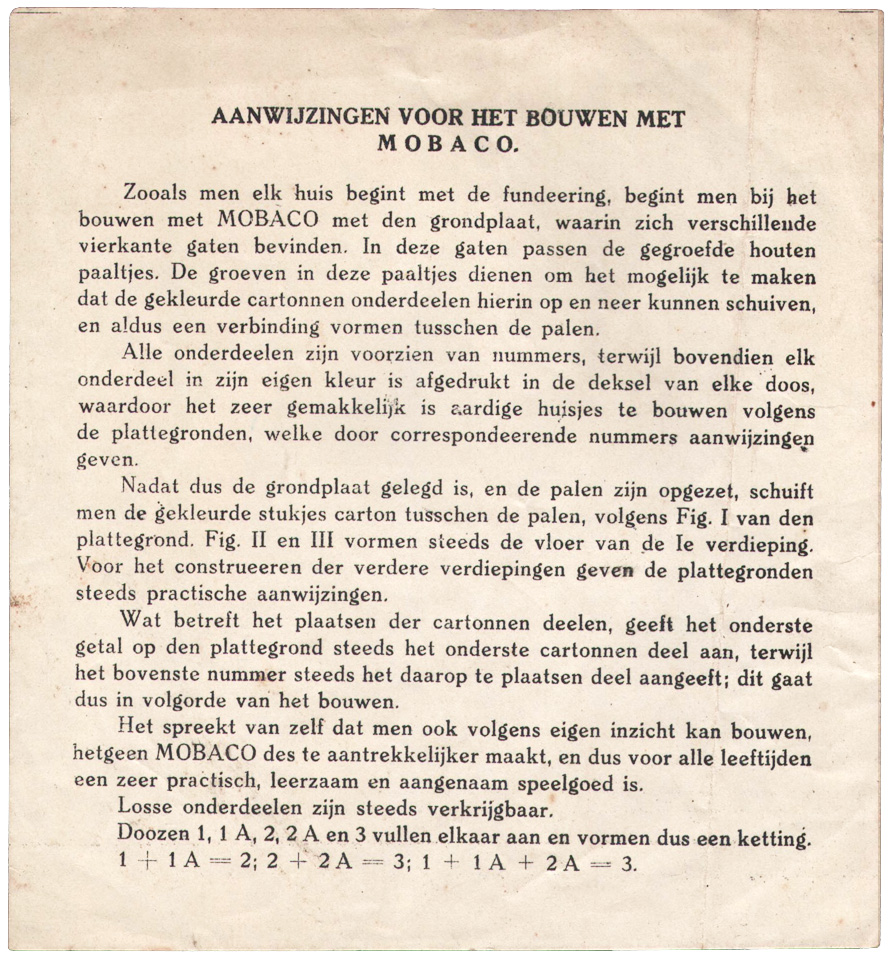 148 x 160 mm 1 page B&W printing |
||||||||||||||||||||||||||||||||||||||||||||||||||||||||||||||||||||||||||||||||||||||||||||||||||||||||||||||||||||||||||||||||||||||||||||||||||||||||||||||||||
| Scan courtesy Leen Kalden 1932(?) - UNDATED LEAFLET - OLD SPELLING - VERSION 1B This leaflet is identical to version 1A above, with the word "verschillende" at the end of the second line. However it uses a different font, which results in slightly different line breaks. The font and line breaks are the same as in Version 2 below, so this leaflet was printed after the leaflet above and before the version below. Perhaps this version was used in 1932. 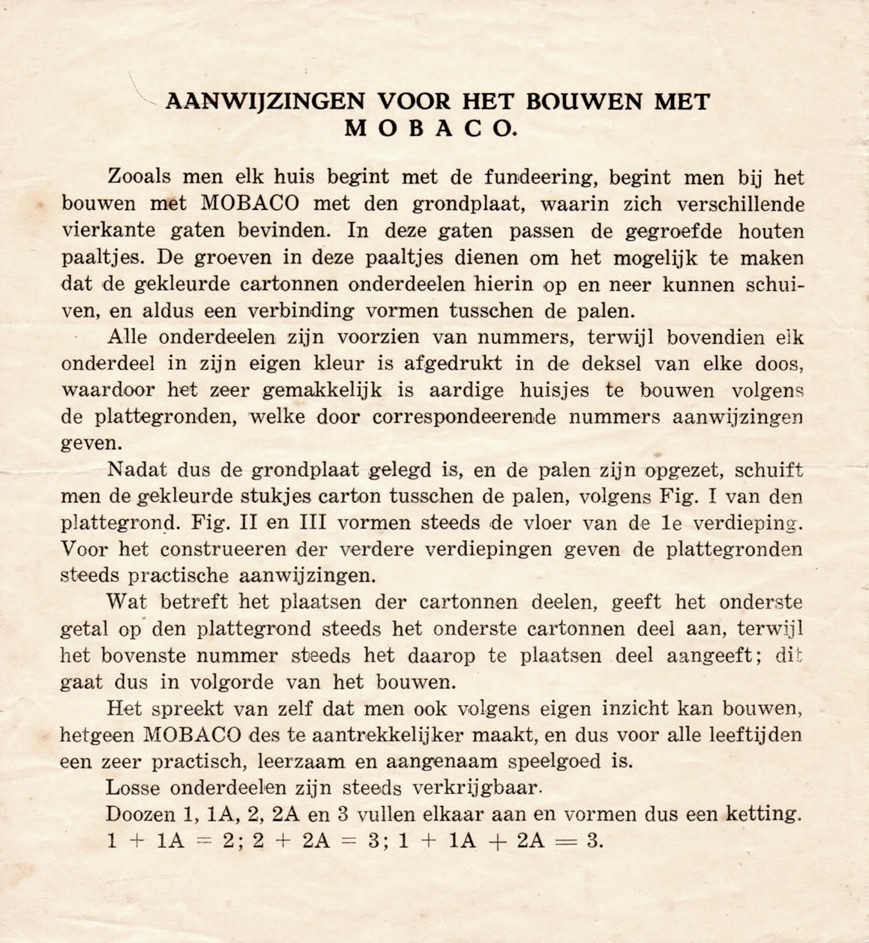 148 x 161 mm 1 page B&W printing |
||||||||||||||||||||||||||||||||||||||||||||||||||||||||||||||||||||||||||||||||||||||||||||||||||||||||||||||||||||||||||||||||||||||||||||||||||||||||||||||||||
| Scan courtesy Leen
Kalden 1933(?) - UNDATED LEAFLET - OLD SPELLING - VERSION 2 This leaflet is similar to above except it has the word "verscheidene" on the second line. All next examples also have "verscheidene", so this undated leaflet probably came after Version 1b above. Perhaps this version was used in 1933. 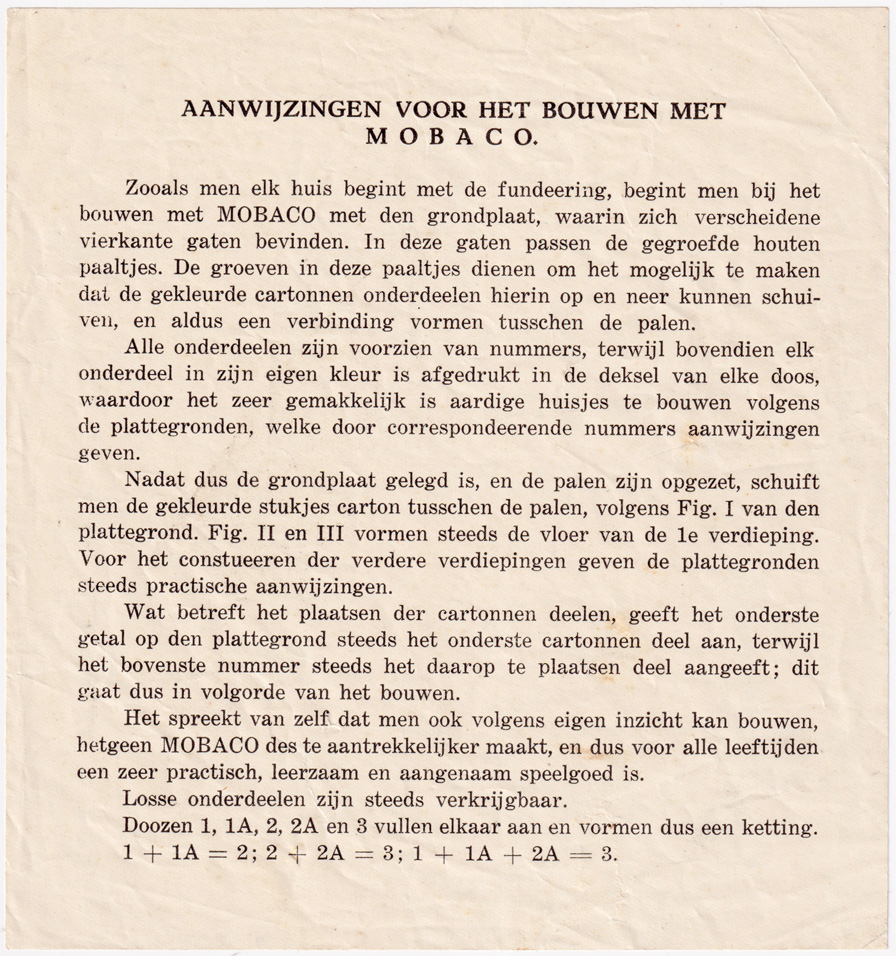 149 x 159 mm 1 page B&W printing |
||||||||||||||||||||||||||||||||||||||||||||||||||||||||||||||||||||||||||||||||||||||||||||||||||||||||||||||||||||||||||||||||||||||||||||||||||||||||||||||||||
| Original courtesy of Nick
Cranendonk NOVEMBER 1934 - INSTRUCTION LEAFLET - OLD SPELLING The printer code indicates that 2,500 copies were printed in November 1934. 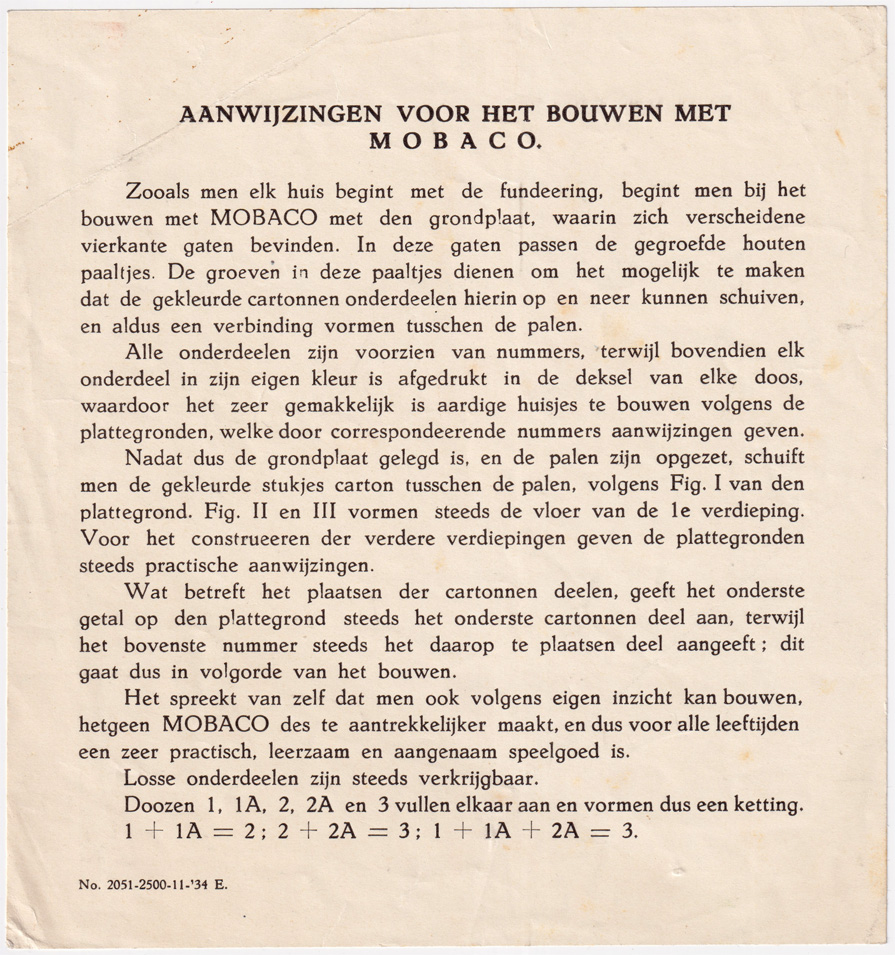 149 x 159 mm 1 page B&W printing |
||||||||||||||||||||||||||||||||||||||||||||||||||||||||||||||||||||||||||||||||||||||||||||||||||||||||||||||||||||||||||||||||||||||||||||||||||||||||||||||||||
| Original courtesy of Nick
Cranendonk FEBRUARY 1935 - INSTRUCTION LEAFLET - OLD SPELLING The printer code indicates that 2,500 copies were printed in February 1935. 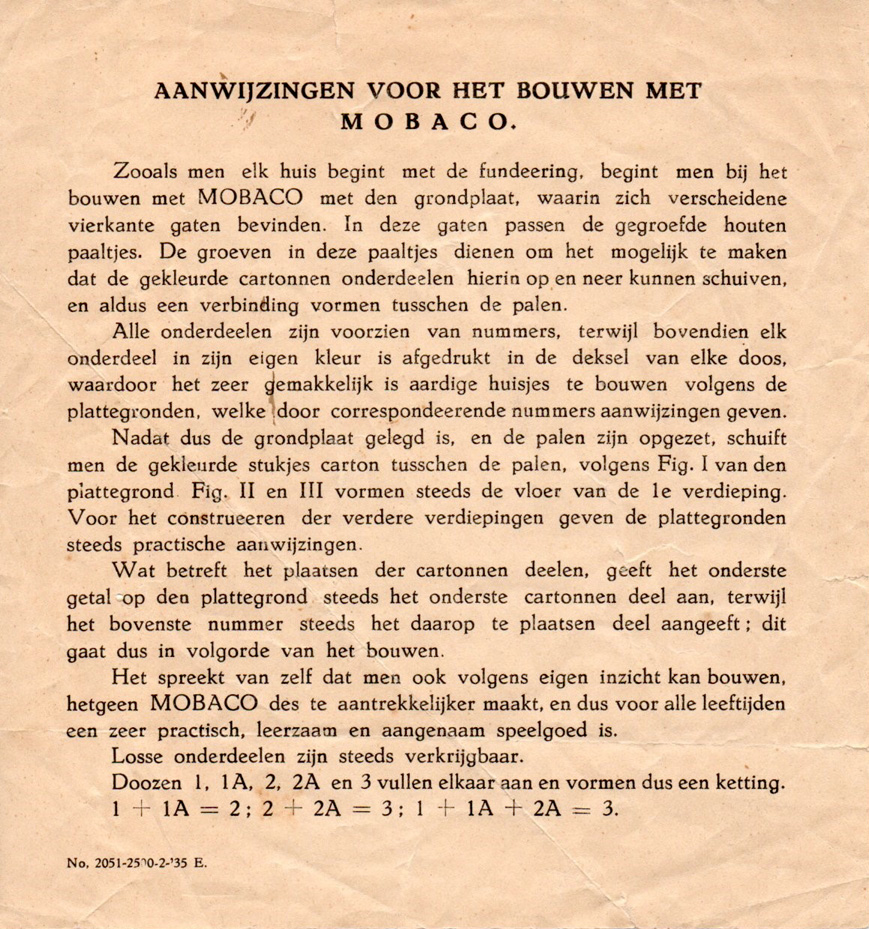 150 x 158 mm 1 page B&W printing |
||||||||||||||||||||||||||||||||||||||||||||||||||||||||||||||||||||||||||||||||||||||||||||||||||||||||||||||||||||||||||||||||||||||||||||||||||||||||||||||||||
| Original courtesy of Leen
Kalden SEPTEMBER 1935 - INSTRUCTION LEAFLET - OLD SPELLING The printer code indicates that 5,000 copies were printed in September 1935. 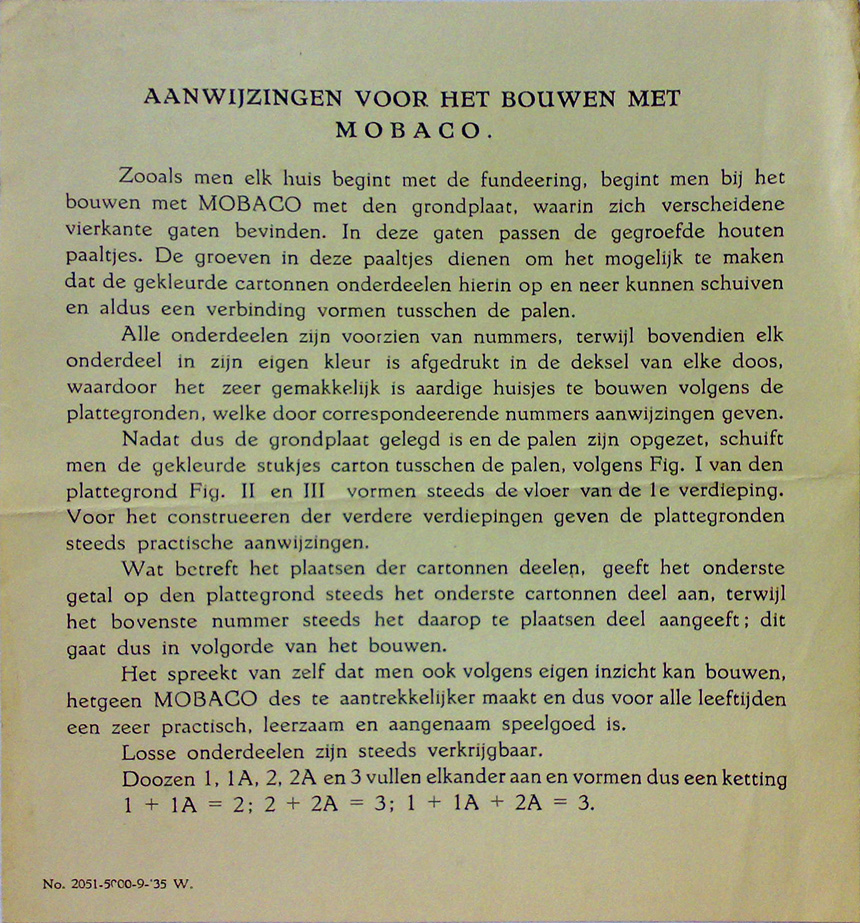 148 x 160 mm 1 page B&W printing |
||||||||||||||||||||||||||||||||||||||||||||||||||||||||||||||||||||||||||||||||||||||||||||||||||||||||||||||||||||||||||||||||||||||||||||||||||||||||||||||||||
| Scan courtesy Leen
Kalden OCTOBER 1935 - INSTRUCTION LEAFLET - OLD SPELLING The printer code indicates that 5,000 copies were printed in October 1935 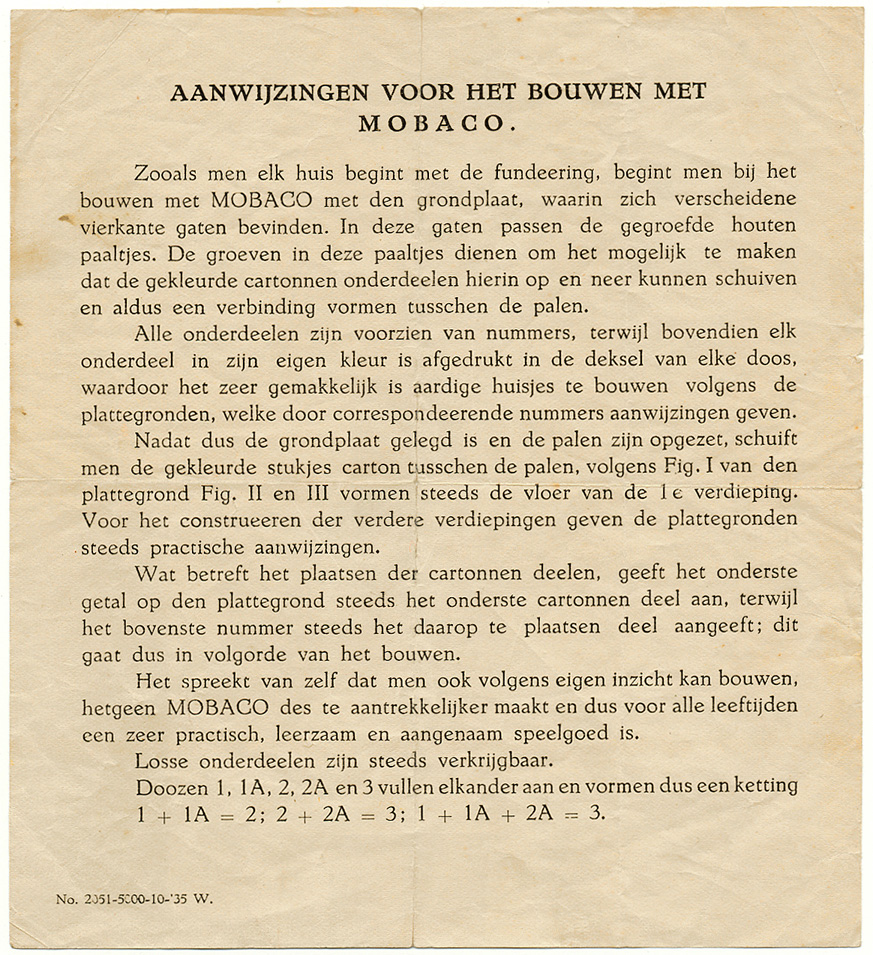 148 x 162 mm 1 page B&W printing |
||||||||||||||||||||||||||||||||||||||||||||||||||||||||||||||||||||||||||||||||||||||||||||||||||||||||||||||||||||||||||||||||||||||||||||||||||||||||||||||||||
| Scan courtesy Rien ten Bos NOVEMBER 1935 - INSTRUCTION LEAFLET - OLD SPELLING The printer code indicates that 10,000 copies were printed in November 1935 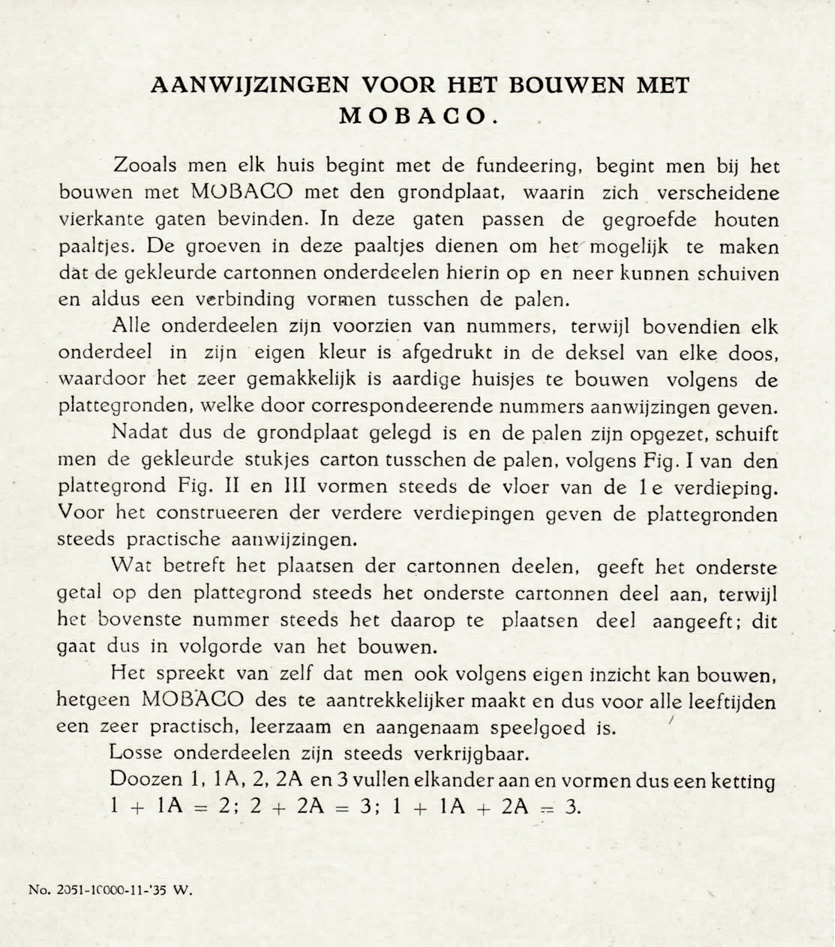 143 x 161 mm 1 page B&W printing |
||||||||||||||||||||||||||||||||||||||||||||||||||||||||||||||||||||||||||||||||||||||||||||||||||||||||||||||||||||||||||||||||||||||||||||||||||||||||||||||||||
| Scan courtesy Leen Kalden JUNE 1940 - INSTRUCTION LEAFLET - OLD SPELLING The printer code indicates that 7,500 copies were printed in June 1940. 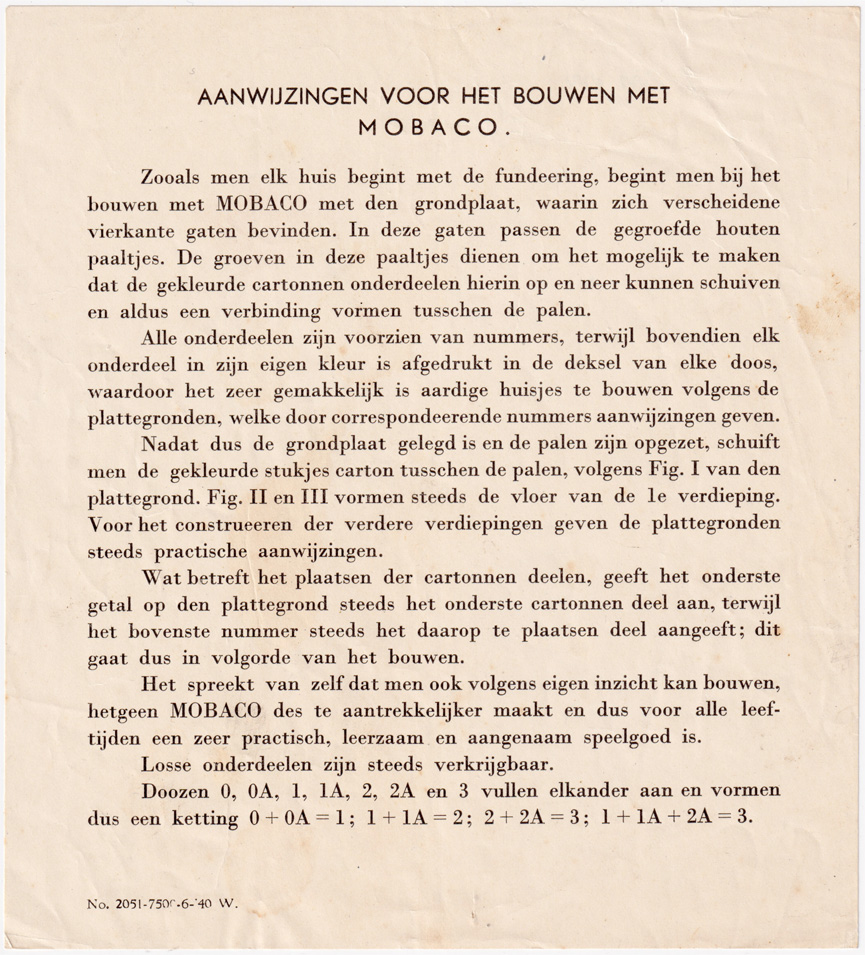 145 x 160 mm 1 page B&W printing |
||||||||||||||||||||||||||||||||||||||||||||||||||||||||||||||||||||||||||||||||||||||||||||||||||||||||||||||||||||||||||||||||||||||||||||||||||||||||||||||||||
| Original courtesy of Nick
Cranendonk UNDATED INSTRUCTION LEAFLET IN ENGLISH As Set 2a is mentioned, this undated English-language leaflet must date from 1931 or later. And we're pretty sure that it's not post-war, so it was in use until at the latest in 1940 (there was no export to England after the war started). 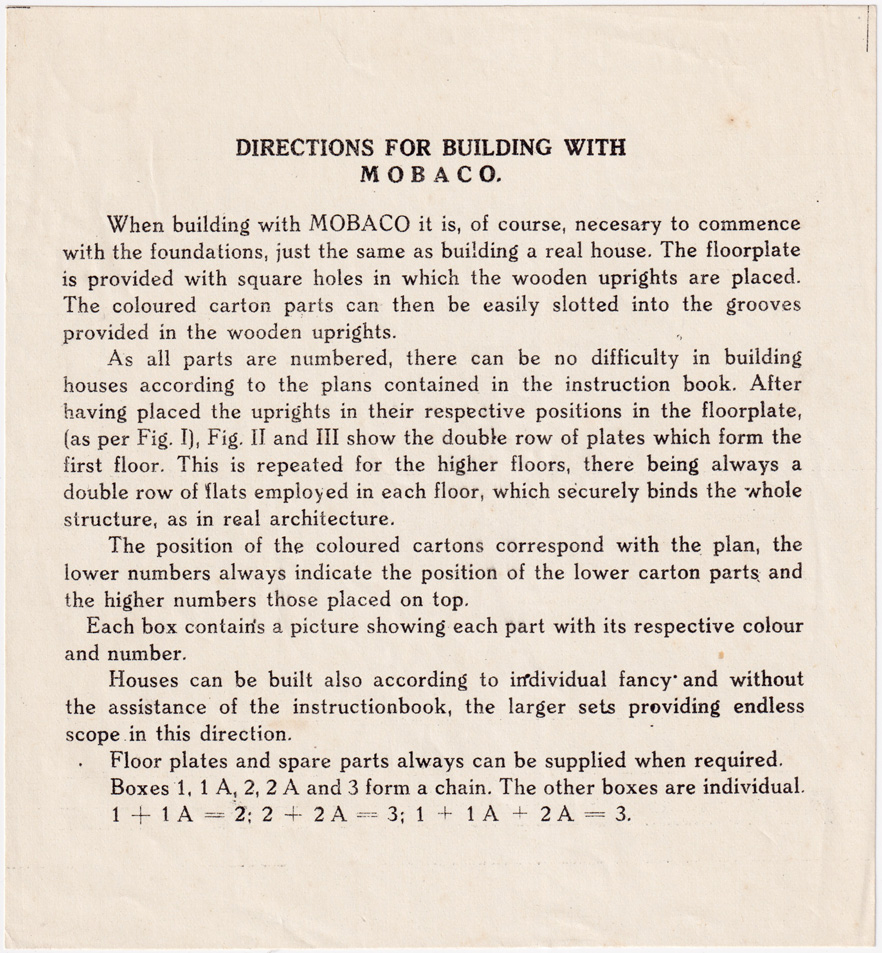 147 x 159 mm 1 page B&W printing |
||||||||||||||||||||||||||||||||||||||||||||||||||||||||||||||||||||||||||||||||||||||||||||||||||||||||||||||||||||||||||||||||||||||||||||||||||||||||||||||||||
| Original courtesy of Nick
Cranendonk UNDATED INSTRUCTION LEAFLET IN FRENCH As Set 2a is mentioned, this undated French-language leaflet must date from 1931 or later. And we're pretty sure that it's not post-war, so it was in use until at the latest in 1940 (there was no export to Belgium, France or Switzerland after the war started). 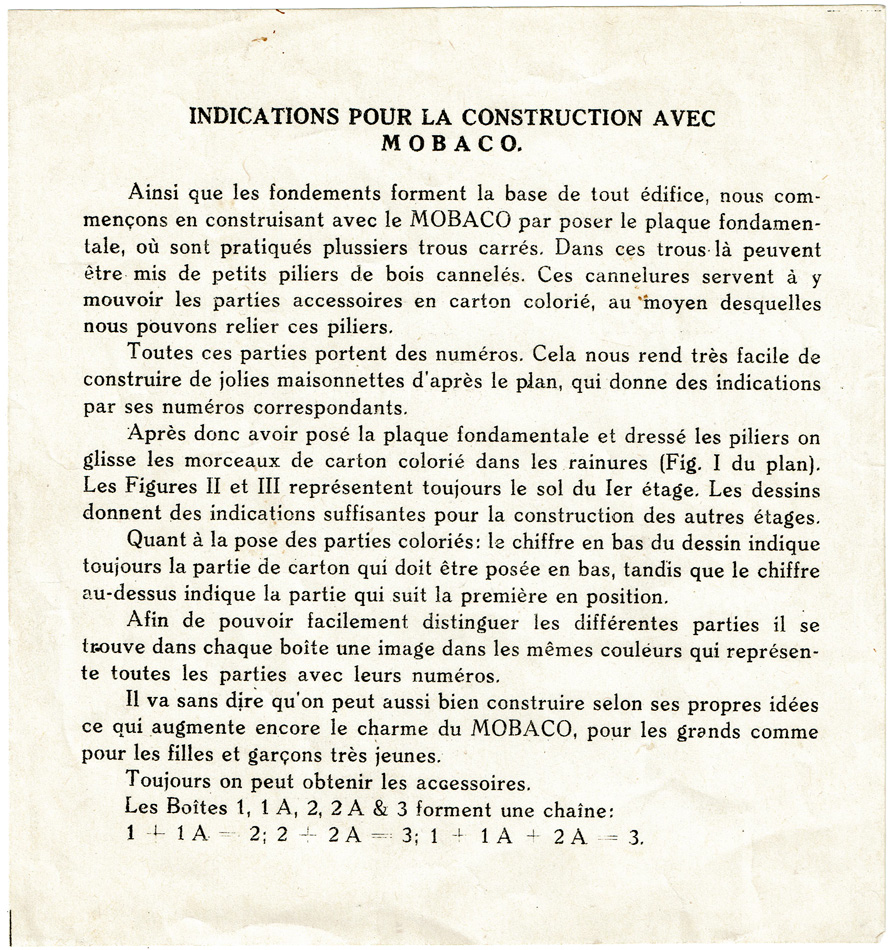 148 x 159 mm 1 page B&W printing |
||||||||||||||||||||||||||||||||||||||||||||||||||||||||||||||||||||||||||||||||||||||||||||||||||||||||||||||||||||||||||||||||||||||||||||||||||||||||||||||||||
| Original courtesy of Henri
de Graaf 1948(?) - UNDATED INSTRUCTION LEAFLET - NEW SPELLING This leaflet with new spelling still has "verscheidene" on the second line, unlike the post-war manuals which used "verschillende". 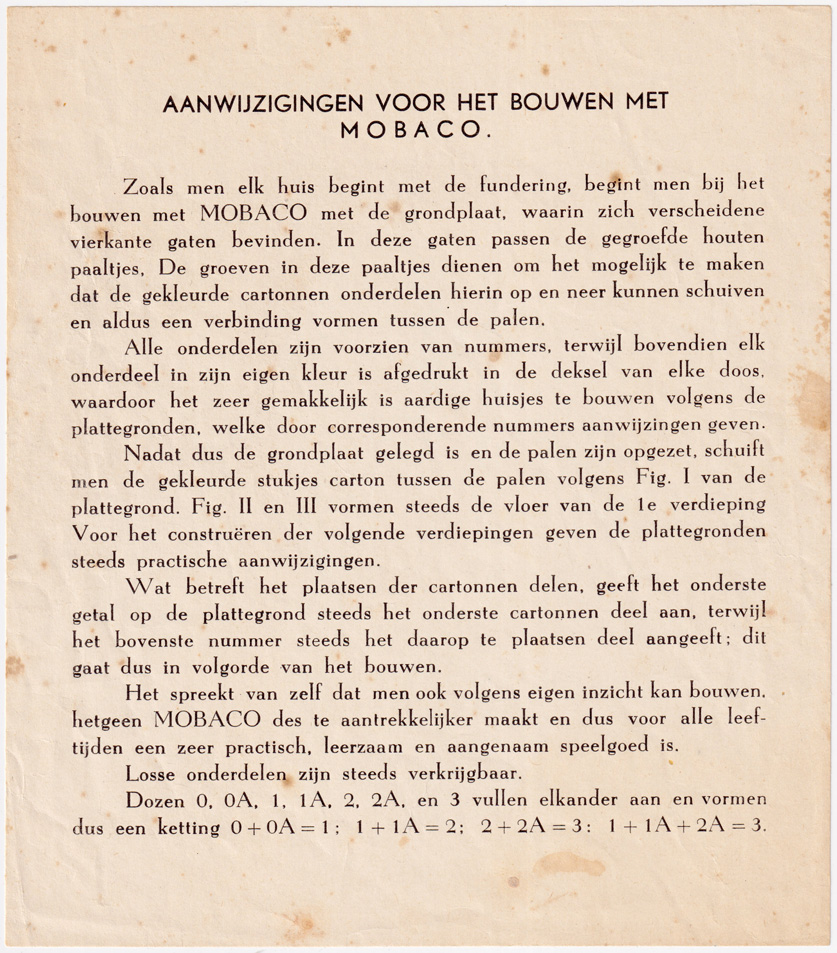 139 x 159 mm 1 page B&W printing |
||||||||||||||||||||||||||||||||||||||||||||||||||||||||||||||||||||||||||||||||||||||||||||||||||||||||||||||||||||||||||||||||||||||||||||||||||||||||||||||||||
| Original courtesy of Nick
Cranendonk |
||||||||||||||||||||||||||||||||||||||||||||||||||||||||||||||||||||||||||||||||||||||||||||||||||||||||||||||||||||||||||||||||||||||||||||||||||||||||||||||||||